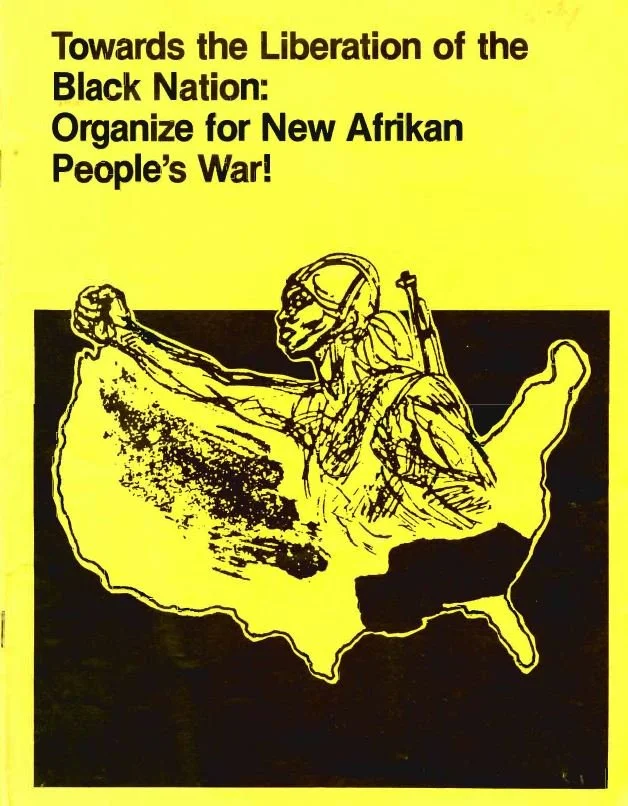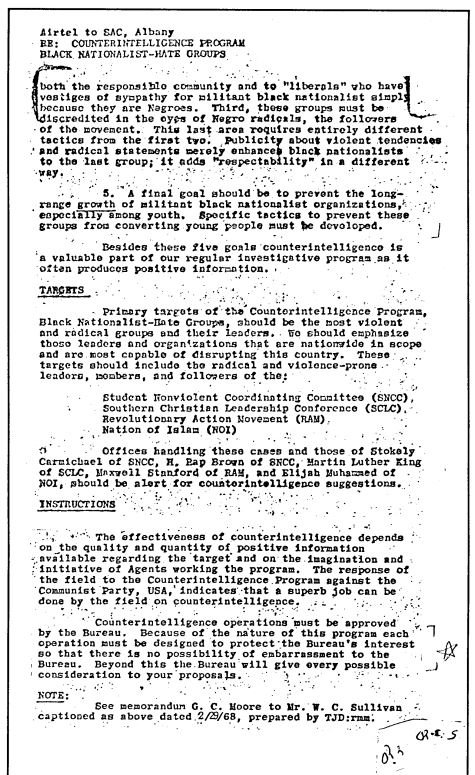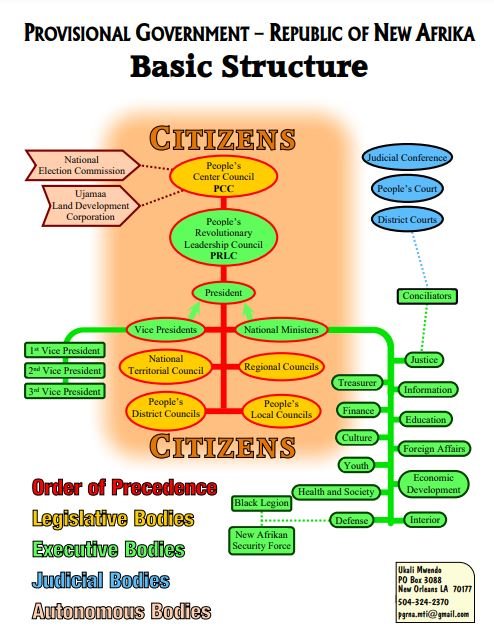JUNE 18, 1452 - THE DECLARATION OF TOTAL WAR AGAINST THE PEOPLE OF AFRIKA.
The Catholic Church launched seven blood baths known as the Christian Crusades which saw 60,000 armed Christians known as Knights Templars wage war, slaughter, butcher, burn, torture and behead non-Christians betwen 1095 and 1291 AD. The Knights Templars went on to establish the modern banking system.
The Dum Diversas Apostolic Edict of Pope Nicholas V on June 18, 1452 states “we grant to you full and free power, through the Apostolic authority by this edict, to invade, conquer, fight, subjugate the Saracens and pagans, and other infidels and other enemies of Christ, and wherever established their Kingdoms, Duchies, Royal Palaces, Principalities and other dominions, lands, places, estates, camps and any other possessions, mobile and immobile goods found in all these places and held in whatever name, and held and possessed by the same Saracens, Pagans, infidels, and the enemies of Christ, also realms, duchies, royal palaces, principalities and other dominions, lands, places, estates, camps, possessions of the king or prince or of the kings or princes,
AND TO LEAD THEIR PERSONS IN PERPETUAL SERVITUDE, AND TO APPLY AND APPROPRIATE REALMS, DUCHIES, ROYAL PALACES, PRINCIPALITIES AND OTHER DOMINIONS, POSSESSIONS AND GOODS OF THIS KIND TO YOU AND YOUR USE AND YOUR SUCCESSORS THE KINGS OF PORTUGAL.” [emphasis added]
The Dum Diversas was followed up by the Romanus Pontifex papal bull of January 8, 1455 granting the Portuguese a perpetual monopoly in trade with Africa. Romanus Pontifex states in part,
“"[and how] after the city of Ceuta, situated in Africa, had been subdued by the said King John to his dominion, and after many wars had been waged, sometimes in person, by the said infante, although in the name of the said King John, against the enemies and infidels aforesaid, not without the greatest labors and expense, and with dangers and loss of life and property, and the slaughter of very many of their natural subjects, the said infante being neither enfeebled nor terrified by so many and great labors, dangers, and losses, but growing daily more and more zealous in prosecuting this his so laudable and pious purpose, has peopled with orthodox Christians certain solitary islands in the ocean sea [Siphiwe Note: as I have always pointed out, it was the conquest of Ceuta where Prince Henry learned of the land of "Guine" and first contemplated the invasion to procure gold and slaves] . . . Moreover, since, some time ago, it had come to the knowledge of the said infante that never, or at least not within the memory of men, had it been customary to sail on this ocean sea toward the southern and eastern shores, and that it was so unknown to us westerners that we had no certain knowledge of the peoples of those parts, believing that he would best perform his duty to God in this matter, if by his effort and industry that sea might become navigable as far as to the Indians who are said to worship the name of Christ, and that thus he might be able to enter into relation with them, and to incite them to aid the Christians against the Saracens and other such enemies of the faith , and might also be able forthwith to subdue certain gentile or pagan peoples, living between , who are entirely free from infection by the sect of the most impious Mahomet, and to preach and cause to be preached to them the unknown but most sacred name of Christ, strengthened, however, always by the royal authority, he has not ceased for twenty-five years past to send almost yearly an army of the peoples of the said kingdoms with the greatest labor, danger, and expense, in very swift ships called caravels , to explore the sea and coast lands toward the south and the Antarctic pole. And so it came to pass that when a number of ships of this kind had explored and taken possession of very many harbors, islands, and seas, they at length came to the province of Guinea, and having taken possession of some islands and harbors and the sea adjacent to that province, sailing farther they came to the mouth of a certain great river commonly supposed to be the Nile, and war was waged for some years against the peoples of those parts in the name of the said King Alfonso and of the infante, and in it very many islands in that neighborhood were subdued and peacefully possessed, as they are still possessed together with the adjacent sea. Thence also many Guineamen and other negroes, taken by force, and some by barter of unprohibited articles, or by other lawful contract of purchase, have been sent to the said kingdoms . . . . to conserve their right and possession, [the said king and infante] under certain most severe penalties then expressed, have prohibited and in general have ordained that none, unless with their sailors and ships and on payment of a certain tribute and with an express license previously obtained from the said king or infante, should presume to sail to the said provinces or to trade in their ports or to fish in the sea, . . . We [therefore] weighing all and singular the premises with due meditation, and noting that since we had formerly by other letters of ours granted among other things free and ample faculty to the aforesaid King Alfonso — to invade, search out, capture, vanquish, and subdue all Saracens and pagans whatsoever, and other enemies of Christ wheresoever placed, and the kingdoms, dukedoms, principalities, dominions, possessions, and all movable and immovable goods whatsoever held and possessed by them and to reduce their persons to perpetual slavery , and to apply and appropriate to himself and his successors the kingdoms, dukedoms, counties, principalities, dominions, possessions, and goods, and to convert them to his and their use and profit — [Siphiwe Note: here is a direct reference to the Dum Diversas Apostolic Edict declaration of war initiating the entire project] by having secured the said faculty, the said King Alfonso, or, by his authority, the aforesaid infante, justly and lawfully has acquired and possessed, and doth possess, these islands, lands, harbors, and seas, and they do of right belong and pertain to the said King Alfonso and his successors , nor without special license from King Alfonso and his successors themselves has any other even of the faithful of Christ been entitled hitherto, nor is he by any means now entitled lawfully to meddle therewith — in order that King Alfonso himself and his successors and the infante may be able the more zealously to pursue and may pursue this most pious and noble work, and most worthy of perpetual remembrance (which, since the salvation of souls, increase of the faith, and overthrow of its enemies may be procured thereby, we regard as a work wherein the glory of God, and faith in Him, and His commonwealth, the Universal Church, are concerned) in proportion as they, having been relieved of all the greater obstacles, shall find themselves supported by us and by the Apostolic See with favors and graces — we, being very fully informed of all and singular the premises, do, motu proprio, not at the instance of King Alfonso or the infante, or on the petition of any other offered to us on their behalf in respect to this matter, and after mature deliberation, by apostolic authority, and from certain knowledge, in the fullness of apostolic power, by the tenor of these presents decree and declare that the aforesaid letters of faculty (the tenor whereof we wish to be considered as inserted word for word in these presents, with all and singular the clauses therein contained) are extended to Ceuta and to the aforesaid and all other acquisitions whatsoever, even those acquired before the date of the said letters of faculty, and to all those provinces, islands, harbors, and seas whatsoever, which hereafter, in the name of the said King Alfonso and of his successors and of the infante, in those parts and the adjoining, and in the more distant and remote parts, can be acquired from the hands of infidels or pagans, and that they are comprehended under the said letters of faculty. And by force of those and of the present letters of faculty the acquisitions already made, and what hereafter shall happen to be acquired, after they shall have been acquired, we do by the tenor of these presents decree and declare have pertained, and forever of right do belong and pertain, to the aforesaid king and to his successors and to the infante, and that the right of conquest which in the course of these letters we declare to be extended from the capes of Bojador and of Não, as far as through all Guinea, and beyond toward that southern shore, has belonged and pertained, and forever of right belongs and pertains, to the said King Alfonso, his successors, and the infante, and not to any others. We also by the tenor of these presents decree and declare that King Alfonso and his successors and the infante aforesaid might and may, now and henceforth, freely and lawfully, in these [acquisitions] and concerning them make any prohibitions, statutes, and decrees whatsoever, even penal ones, and with imposition of any tribute, and dispose and ordain concerning them as concerning their own property and their other dominions. And in order to confer a more effectual right and assurance we do by these presents forever give, grant, and appropriate to the aforesaid King Alfonso and his successors, kings of the said kingdoms, and to the infante, the provinces, islands, harbors, places, and seas whatsoever, how many soever, and of what sort soever they shall be, that have already been acquired and that shall hereafter come to be acquired, and the right of conquest also from the capes of Bojador and of Não aforesaid. . . . Moreover, we entreat in the Lord, and by the sprinkling of the blood of our Lord Jesus Christ . . . we more strictly inhibit all . . . to do anything by themselves or another or others, directly or indirectly, by deed or counsel, or to offer any obstruction whereby the aforesaid King Alfonso and his successors and the infante may be hindered from quietly enjoying their acquisitions and possessions, and prosecuting and carrying out this conquest . . . . Therefore let no one infringe or with rash boldness contravene this our declaration, constitution, gift, grant, appropriation, decree, supplication, exhortation, injunction, inhibition, mandate, and will. But if anyone should presume to do so, be it known to him that he will incur the wrath of Almighty God and of the blessed apostles Peter and Paul."
2. 1518 TO 1779 - ASIENTO WAR CONTRACTS
The Dum Diversas Apostolic Edict was followed up with monopoly contracts known as “Asientos'' that were variously granted by the Catholic Church to private merchants from 1518 to 1595, to Portugal from 1595 to 1640, to the Genoese (Italy) from 1662 to 1671, to the Dutch and Portuguese from 1671 to 1701, to France 1701-1713, the British 1713 to 1750, and the Spanish 1765 to 1779. Several British colonies became combatants to the Dum Diversas War when they legalized slavery: Massachusetts in 1641; Connecticut in 1650; Virginia in 1657 and Maryland in 1663. By June 1680, there was legislation for preventing Negro insurrection.In the Northen Neck region of Virginia in 1687, the Africans planned an attack that was discovered and prompted in 1688 stricter laws to prevent insurrection. The crucial turning point for Notth America in the war was the so-called Glorious Revolution in 1688, which caused the British monarchy to retreat and led to the ascendancy of a rising class of “private” or “separate” merchants who entered the war to the detriment of the Royal African Company monopoly. Then, Parliament declared on 24 June 1698 and continuing in force until at least until 24 June 1712, the trafficking of prisoners of war was open “to all His Majesty’s subjects”. These military entrepreneurs then invaded the African continent causing a quantum leap in the number of captured prisoners of war who were then trafficked to the British colonies. As more Africans were brought directly to the British colonies, the more the war intensified in the colonies, particularly in Manhattan in 1712 and 1741, and South Carolina in 1739. As a precursor to the COINTELPRO program issued against the New Afrikan Indpendence Movement in 1967, by the early 1700s a law was passed for preventing the conspiracy of Africans with the death penalty assigned to those who did so, with their masters reimbursed. Anxiety rose when officials in Virgina in 1709 received intelligence of several meetings of Africans at quarters where there were no white men or freemen overseers and where plots of using force to kill the whites and make an escape were discovered. A few months later laws were enacted preventing any assembling of Africans. By 1711, writes historian Gerald Horne, “officials were continuing to debate - and stressin - ‘better securing …. Governm[ent] and Her Majesty’s subjects of this Colony [against] attempts of Negro and other slaves” to revolt.. In the midst of this turmoil, the decision was taken to try . . . Scipio a Negro slave for ‘High Treason,’ leading to a ‘sentence of death’ on the premise that ‘their execution and exemplary punishment may have a due effect for detering other slaves’”. [Note: like the assasinations of Malcolm X, Martin Luther King, and Fred Hampton just to name a few] . . . In early 1748 in South Carolina, a plot of the New Afrikan warriors was uncovered to liquidate European settlement, By 1750, London declared the that the invasion of Africa open to all, which further increased the number of prisoners of war trafficked across the Atlantic. This enormous influx of Africans - which in South Carolina from 1720 through to the American revolution constituted 60% of the populations - meant that more “whites” had to be attracted to the continent to countervail the ferocity of resistance of the Africans, and ultimately , an expanded set of rights for the European migrants, along with land seized from the indenous, was crucial in enticing them into a pan-Europeanism or “whiteness” which resulted in a system of white supremeacy and a commitment to war against the African in the British colonies. According to Professor Horne, “Land grants, along with a compliment of rights . . . were akin to offering a material incentive - ‘combat pay’ to a soldier about to enter a war zone, which is what a good deal of the settlements were at that juncture and for a considerable time thereafter.” Benjamin Franklin stated, “ Every slave might be reckoned a domestic enemy.” The rebellious traitors against the British King all were great war profiteers: by 1764 Geroge Washington owed a London creditor eighteen hundred pounds sterling. John Hancock was one of Boston’s largest slave owners. John Adams earned hadnsome fees as legal counsel for slaveholders in cases against the enslaved. During this period, the Africans in colonial America contemplated a polity led by themselves in league with the indigenous and at times, other compliant European powers. As British sought to abolish slavery in its colonies, the rebels declared unilateral independence. The United States of America officially entered the Dum Diversas War trafficking of people from Guine (Africa) after the American pro-slavery counter revolution in 1776, establishing the first apartheid state in history.
3. JUNE 21, 1788 - THE UNITED STATES OFFICIALLY ENTERS THE WAR
The Constitution became the official framework of the government of the United States of America when New Hampshire became the ninth of 13 states to ratify it. In the book, Reparations Yes! The Legal and Political Reasons Why New Afrikans - Black People In The United States - Should Be Paid Now For The Enslavement of Our Ancestors And For War Against Us After Slavery, former President of the Provisional Government of the Republic of New Afrika (PG-RNA), Imari Obadele, stated
"The central proposition of this paper and the draft bill for reparations which is annexed hereto is that our enslavement in the Thirteen Colonies and the United States was a matter of war - war conducted against Afrika under authority, initially, of the British government and the legislatures of the Thirteen Colonies and ultimately under authority of Clause One, Section 9 of the First Article of the United States Constitution. . . . It was a war conducted against Afrikan people - who grew into a nation, an oppressed nation, between 1660 and 1860 - within the United States under British and Colonial authority and, ultimately, the authority of Clause Three, Section Two of Article Four of the U.S. Constitution." [emphasis added]
4. 1861 TO 1863 - PRESIDENT ABRAHAM LINCOLN ISSUES WAR MEASURE CEASE-FIRE, RELEASING NEW AFRIKAN PRISONERS OF WAR AND RECOGNIZES CENTERS OF GOVERNMENT OF THE NEW AFRIKAN NATION
Prior to the United States Confiscation Acts of 6 August 1861 and 17 July 1862 and the Emancipation Proclamation, which went info effect on 1 January 1863, “persons” - so denominated by Article One, section 2, Paragraph 3 of the United States Constitution; Article One, Section 9, Paragraph 1 and Article Four, Section 2, Paragraph 3 of the same Constitution - kept in slavery in the United States were legally held to be a class of property. Those held in slavery were of the African race, since, according to Mr. Chief Justice Taney of the United States Supreme Court, speaking for the majority in Dred Scott V. Sandford (1857) 19 How 393 “the traffic in slaves in the United States had always been confined to them.”
However, in 1862, acting under his war powers and “as a fit and necessary war measure” for suppressing rebellion, United States President Abraham Lincoln issued an Emancipation Proclamation, which took effect on 1 January 1863. On that date, with that act, the Chief Executive of the United States significantly enlarged the new class of free men which had first been called into existence by the Confiscation Acts of 6 August 1861 and 17 July 1862 and which theretofore did not exist in United States legal contemplation.
Moreover, this new class of free men was not made United States citizens. President Lincoln received an island from Haiti, by cession, and here he attempted through the Secretary of the Interior, in 1863, to settle members of the new class in an independent state of their own, similar to Liberia. Four hundred members of that portion of the New Class which sought independent Statehood actually went to the island, but the project was ill-supported, many died, and the rest returned to rejoin their fellows in the struggle for full sovereignty for the independent New Afrikan nation. The activity of the American “Executive Government” was the first negotiation with the first Government created in the United States by the nationalist portion of the new class. In like manner, proceeding under powers granted by the United States Constitution and by Congress in the Confiscation Acts and by the President in the Emancipation Proclamation, other representatives of the United States Executive Government extended recognition to other centers of Government of the New Afrikan nation.
On January 12, 1865 the United States Secretary of War Edwin McMasters Stanton and United States Army General William Tecumseh Sherman met in Savannah, Georgia with a New Afrikan government council of twenty people representing the new class of free persons. In response to General Sherman’s Fourth request to “State in what manner you would rather live - whether scattered among the whites or in colonies by yourselves,” the spokesperson for the black Government council, Garrison Frazier answered: “I would prefer to live by ourselves, for there is prejudice against us in the South that will take years to get over; but I do not know that I can answer for my brethren.” The record shows that Mr. Lynch said he thinks they should not be separated but live together. All the other persons present, being questioned one by one, answer that they agree with Brother Frazier. As a result of these negotiations, the closest thing that New Afrikans had to a plebiscite to determine their will and aspirations as free men, General Sherman issued Special Field Order Number 15.
The commerce between U.S. President Lincoln and the representatives of the New Afrikan government which resulted in the Haitian-island project was an explicit U.S. recognition of the New Afrikan nation and government, as were the meetings between Secretary Stanton and General Sherman and the East Coast New Afrikan Government Council, which resulted in the Sea Islands Governments (population 40,000) as was the creation of the Davis Bend Government under Superintendent John Eaton in Mississippi (population 72,000). Here, then, was the establishment of self-governing New Afrikan communities under the protection of the United States on land to which the Americans claimed ultimate title but to which the New Afrikans had been given possessory title by General Sherman, acting lawfully for the Congress and the President. And the placing of the communities under United States protection with only possessory titles put the New Afrikan nation here on a footing with the various Indian nations. It is to be kept in mind that this center of the New Afrikan nation, while in a subject relationship to the United States, was nevertheless a center of free men possessed of the inalienable right to liberty, including self-determination, just as were the thirteen British colonies in America. However, the war and slavery continued in the United States after the Emancipation Proclamation and 13th amendment under new forms.
5. JUNE 1866 - WAR IN DISGUISE: THE 14TH AMENDMENT CAMPAIGN OF FRAUD CONTINUES THE WAR AGAINST THE NEW AFRIKAN NATION
Thus, by word and action, did the American government recognize the fledgling New African nation and the right of the new class, in exercise of its inherent liberty, to independent Statehood, voluntary repatriation, or emigration to Haiti and other territories. The status of the New Afrikan self-governing territories and voluntary, compensated repatriation was removed through a United States official campaign of fraud and terrorism resulting from the assassination of Abraham Lincoln. As noted by Imari Obadele,
“Just as soon as the United States Government recognized the inalienable rights of the new class of free men - namely the right to seek admission, as citizens, to the American community; the right to return home, to Africa; the right to general emigration and the right to set up an independent State of its own; segments of American society began to narrow the options for the new class which it, the American community, as a matter of political action, would accept.
As early as December 1863 the United States Secretary of the Interior suggested that the new class of free men should not be sent away because they were needed in the United States Army. Also, in April 1865, General Butler replied to President Lincoln’s request for logistical information that ‘using all your naval vessels and all the merchant marine fit to cross the seas with safety, it wil be impossible for you to transport to the nearest place that can be found fit for them - and that is the Island of Domingo - half as fast as Negro children will be born here.’
In the report of the United States Congress’ Joint Committee of Fifteen, 18 June 1866, the Congress explains how this difficult logistical problem - meaning that the new class would stay in the United States and largely in the South - helped determine, from the viewpoint of the American community, that the new class should be given the vote and United States citizenship. The new class, as voters, could be counted upon to support the United States government in power, whereas that segment of the American community until recently denominated the Confederacy could be counted upon to oppose the government in power. If the new class remained voteless, as they were during slavery, when each slave was counted as only three-fifth a man in the basis of representation, their numbers as free men would nevertheless give the former Confederacy a huge increase in members in the House of Representatives and the Electoral College, because now, even if voteless, the free man would be counted as five fifths, instead of three-fifths, a man. Said the Committee: ‘The increase of representation necessarily resulting from the abolition of slavery was considered the most important element in the questions arising out of the changed condition of affairs, and the necessity for some fundamental action in this regard seemed imperative.’ Thus, the American community - reacting to its own need for black labor and reacting to what it believed to be a difficult logistical problem in emigration and reacting to a fear of increased political power for the Confederates - determined to limit the liberty of the new class of men, in the political arena, to the single option of the United States citizenship.
The Fourteenth Amendment, passed by Congress in June 1866 and ratified by the States in July 1868, was, then, the consecration of a campaign of war and fraud by the American community against the new class, wrongfully and illegally to prevent the new class from exercising the full range of political liberty that belonged to it. The new class was not to be barred from accepting membership in the American community - indeed, the Fourteenth Amendment attempted to order the new class into the American community - although that membership would be limited politically and socially. The new class would not be prevented from emigrating in small numbers and at its own expense. But it would be prevented - under this illegal campaign consecrated by the Fourteenth amendment - from establishing independent sovereignty over a land mass in what the American community deemed to be the actual and potential land of the United States. But the campaign was - and is - an illegal application of the Fourteenth Amendment.
Further, a full appreciation of the erroneous interpretation which lies upon the Fourteenth Amendment when it is conceived to have imposed citizenship upon the new class, either in 1868 or anytime since, or when it is conceived as being capable of doing so, cannot be had without a recognition of the role of fraud in leading many members of the new class to assume they were or are United States citizens and that, in 1868, we had no choices except United States citizenship or unprotected peonage. After the assasination of Mr. Lincoln, there is no evidence anywhere that the United States government or any of the private institutions that concerned themselves with the freedmen and Reconstruction attempted to inform the freedman of his rights under international law or worse, that either the United States government or those private institutions did anything except promote the idea that the new class had only the two said options, U.S. citizenship or peonage . . . .
This massive fraud, continuing today, constitutes almost certainly the most infamous such fraud and rape of the rights of free men in all history. Today New Africans, fully aware of their rights under international law and the fraud which has been perpetrated upon us, appear in American courts maintaining our nationality as New African and asserting our freedom and right to this nationality under the Confiscation Acts, the Emancipation proclamation, the Thirteenth Amendment, and Article Fifteen of the Universal Declaration of Human Rights, but are summarily told by prosecutor and Court that we are not New Afrikans, and are not possessed of inalienable liberty, and are - under the Fourteenth Amendment - United States Citizens. This is an invidious, illegal, and wrong interpretation of the Fourteenth Amendment. . . . The Fourteenth Amendment could not operate upon a free group of people, constructed outside of the American community, without that group’s informed consent . . . The Fourteenth Amendment represented a political decision by the American community. That decision - patently illegal since based on the Fourteenth Amendment - was to limit the new class largely to the option of a curtailed United States citizenship and to wage war against the nationalist portion of the new class. . . .
President Johnson led in suppressing the centers of New African government. All of these centers - from the territory of Tunis Campbell, later State Senator in Georgia, and the South Carolina Sea Islands governments in the east, to Davis Bend and the Mississippi governments in the west - were put down by 1866 by the United States Army, the United States Courts and other United States functionaries. Significantly, the U.S. Army was resisted in several places by armed New Afrikan militia - a clear sign that these centers of New Afrikan government had opted for complete independence in the manner of the Thirteen colonies, and through this use of their right to independence, carried out on land to which they asserted sovereign rights, based on principles of long occupancy and reparations, while that land was still in territorial status, had given full subsistence to the existence of the New Afrikan nation. Yet the forms were put down. In addition, the meetings and conventions of both that segment of the new class pursuing citizenship and that segment seeking independence were harassed and subjected to terror. When, in 1867, Congressional Reconstruction came in, the segment of the new class willing to proceed along lines dictated by the U.S. Congress received some support of the U.S. Army against the widespread white violence to which it was being subjected. But the nationalist segment remained the object of suppression by the total white community, although that suppression never succeeded in eliminating the New Afrikan nation. It is not too strong to say that all this was - and is - war. The words of Mr. Justice Johnson, of the U.S. Supreme Court, writing in his concurring separate opinion in ‘Cherokee Nation v. The State of Georgia’ 5 Peters 25, BL. ed., at the Court’s January Term in 1831, come readily to mind. Said he: ‘What does this series of allegations exhibit but a sovereign independent State, and set out that another sovereign State has, by its laws, its functionaries, and its armed force, invaded their state and put down their authority. This is war in fact; though not being declared with the usual solemnities, it may perhaps be called war in disguise.’ Despite this war by the stronger community against the weaker, which took clear form in 1868, and has continued ever since, except for a brief respite in 1968, that portion of the new class of men which deemed itself to be a nation, has persisted in its nationhood down through the present. Its forms have not always been conventional, because of the necessity to be plastic in order to survive the war being waged against it. But the New Afrikan nation has persisted. . . . That at the present time the nationalists among the new class should be led by two major political states - the Nation of Islam and the Republic of New Afrika - is no derogation of the black nationalists. The United States itself was originally composed of not just two but thirteen sovereign States and ultimately added such disparate units as Louisiana and Puerto Rico. The emergence of the Nation of Islam and the Republic of New Afrika is the result of black nationalist efforts - despite the war being waged against us by the more powerful American nation - to create a more perfect political union and more conventional forms of government. All that has gone before represents a continuous evolution of the black nation in America, from the Haitian-island group through the Sea Islands and Davis Bend governments and the less conventional forms that followed, to the Nation of Islam and the Republic of New Afrika, in the face of a severe, illegal, and unrelenting war of extinction waged by the American nation. Through it all, the New Afrikan nation has continued to exist.”
6. 1871 - 1913 TRANSFER TO THE UNITEDS STATES CORPORATION, BIRTH/STOCK CERTIFICATES AND THE FEDERAL RESERVE
After the American Civil War (1861-1865), Congress realized that the country was in dire financial straits, so they made a financial deal with the Rothschilds of London thereby incurring a DEBT. The District of Columbia Organic Act of 1871 established a constitution for the government of the District of Columbia, an INCORPORATED government under British rule (which is under Vatican rule) known as the UNITED STATES CORPORATION. It operates in an economic capacity as a “Crown colony” .
The United States and the Evil Practice of Issuing Birth Certificates
1. The United Dutch East India Company, in October of 1604, commissioned Hugo Grotius to write the Commentary on the Law of Prize and Booty to justify the Dutch capture in 1603 of a wealthy Portuguese merchantman, the Santa Catarina, in the Strait of Singapore. In a clever and intricate defense of international free trade, Groitus introduced the notion of man as a sovereign and free individual with a right to self-defense and, by extension, the right of a company of private merchants to establish a trade empire. Such justification -unprecedented in early modern political and legal philosophy – revolutionized natural law and natural rights theories, just as it gave a new impetus to the discussion of “just war”. These ideas became of central importance during the Enlightenment and were used in all subsequent debate about Western colonization and imperialism. The freedom of the seas – meaning both the oceans of the world and coastal waters – became one of the most contentious issues in international law. The Free Sea, the twelfth chapter of Commentary on the Law of Prize and Booty, transcended its immediate legal and diplomatic contexts and had implications no less for coastal waters than it did for the high seas, for the West Indies, and for intra-European disputes as well as for relations between the European powers and the extra-European peoples. Thus, is established Maritime Admiralty Law which, today, is called the Uniform Commercial Code (UCC).
2. There are two kinds of law that rule the entire earth. All governments are ruled by civil law which is called in all countries, the law of the land, and maritime admiralty law, the law of the sea (UCC).
3. Consequently, when a ship pulls into port it docks, it is in its ‘berth”. Because it is on the seas it is under Maritime Admiralty Law (UCC). The first thing a captain must do is present a certificate (defined as a paper establishing an ownership claim) of manifest to the port authorities. The Authorities must know how much is on the ship and what is being bought into their economy. This represents the birthdate of that product in the custody (ownership) of the respective nation.
4. After the American Civil War (1861-1865), Congress realized that the country was in dire financial straits, so they made a financial deal with the Rothschilds of London thereby incurring a DEBT.
The District of Columbia Organic Act of 1871 established a constitution for the government of the District of Columbia, an INCORPORATED government under British rule (which is under Vatican rule) known as the UNITED STATES CORPORATION. It operates in an economic capacity as a “Crown colony”.
5. Edward Mandell House was a member of the Cecil Rhodes Round Table Group that sought to establish a graduated income tax, a central bank, creation of a Central Intelligence Agency, and the League of Nations. Between 1901 and 1913 the House of Morgan and the House of Rockefeller formed close alliances with the Dukes and the Mellons. This group consolidated their power and came to dominate other Wall Street powers including Carnegie, Whitney, Vanderbilt, Brown-Harriman, and Dillon-Reed. The Round Table Group wanted to control the people by having the government tax people and deposit the peoples’ money in a central bank. The Group would take control of the bank and therefore have control of the money. The Group would take control of the State Department and formulate government policy, which would determine how the money was spent. The Group would control the CIA which would gather information about people, and script and produce psycho-political operations focused on the people to influence them to act in accord with Round Table Group State Department policy decisions. The Group would work to consolidate all the nations of the world into a single nation, with a single central bank under their control, and a single International Security System. Edward Mandell House, with the financial backing of the House of Rockefeller’s National City Bank, becomes instrumental in getting Woodrow Wilson elected as President in 1912. Some of the first legislation of the Wilson Administration was the institution of the graduated income tax (1913) and the creation of a central bank called the Federal Reserve. An inheritance tax was also instituted. These tax laws were used to rationalize the need for legislation that allowed the establishment of tax-exempt foundations. The tax-exempt foundations became the link between the Group member's private corporations and the University system. The Group would control the Universities by controlling the sources of their funding. The funding was money sheltered from taxes being channeled in ways which would help achieve Round Table Group aims. Edward Mandell House had this to say in a private meeting with President Woodrow Wilson:
“[Very] soon, every American will be required to register their biological property in a national system designed to keep track of the people and that will operate under the ancient system of pledging. By such methodology, we can compel people to submit to our agenda, which will effect our security as a chargeback for our fiat paper currency. Every American will be forced to register or suffer being unable to work and earn a living. They will be our chattel, and we will hold the security interest over them forever, by operation of the law merchant under the scheme of secured transactions.
Americans, by unknowingly or unwittingly delivering the bills of lading to us will be rendered bankrupt and insolvent, forever to remain economic slaves through taxation, secured by their pledges. They will be stripped of their rights and given a commercial value designed to make us a profit and they will be none the wiser, for not one man in a million could ever figure our plans and, if by accident one or two should figure it out, we have in our arsenal plausible deniability. After all, this is the only logical way to fund government, by floating liens and debt to the registrants in the form of benefits and privileges. This will inevitably reap to us huge profits beyond our wildest expectations and leave every American a contributor to this fraud which we will call “Social Insurance.” Without realizing it, every American will insure us for any loss we may incur, and, in this manner, every American will unknowingly be our servant, however begrudgingly. The people will become helpless and without any hope for their redemption and, we will employ the high office of the President of our dummy corporation to foment this plot against America.”
6. The federal government first developed a standard birth certificate application form in 1907, five years after the Census Bureau began collecting data. The current system of the states collecting data and reporting it to the federal government developed between 1915, when the federal government mandated that states collect and report the data, and 1933, by which time all of the states were participating.
7. Consequently, when you are born you come out of your mother’s water. Therefore, you are subject Maritime Admiralty Law (UCC). Hence the dock(tor) has you sign a berth/birth certificate, a certificate of manifest because you are a corporation-owned item. At this point you become stock in a Maritime Admiralty (UCC) banking scheme. Stock is defined as “capital”. Capital is defined as an “asset”. And an asset is defined as a useful or valuable thing, person or quality. As stock registered with the United States Corporation, you represent a “value” which is calculated by the amount your future labor can produce. Your birth certificate is therefore not proof of your having been born, it is actually a stock share. The proof of your having been born is the placenta. The placenta is the asset that connects your dna to your mother and father. It is the actual evidence of your identity, derived from your genetic lineage. Traditionally, many African people like the Balanta people bury the placenta near the house of their parents or grandparents, thereby claiming ownership and depositing the genetic evidence in the territory occupied by the parents. In the United States, however, both the spiritual and legal function of the placenta and the importance of claiming/securing it is intentionally omitted from society and the educational system.
8. A “birth” notice is published in the public record and after a period of time, if no one claims the placenta, it is considered “lost at sea” or “dead at sea”. The placenta is disposed or destroyed and there is no “proof” that you have been born. At that moment, the “birth certificate” creates a fictitious “person” as a “corporate asset” owned by the United States Corporation. This asset’s stock certificate (proof of future value) can now be held as collateral to secure the debt which the United States of America owes to the international bankers. Meaning, YOU MUST LABOR WITHIN THE SYSTEM OF THE UNITED STATES CORPORATION TO PRODUCE BOTH VALUE FOR THE CORPORATION AND TO PAY TAXES TO THE CORPORATION.
7. 1917 - 1919 - THE UNITED STATES CORPORATION CONTINUES THE WAR THROUGH FRAUD AT THE LEAGUE OF NATIONS
By 1917, Cyrl V. Briggs had reiterated Garrison Frazier’s petition to establish self-governing New African colonies, calling for “Colored Autonomous States”. This seemed to be the appropriate application of President Woodrow Wilson's calls for self determination under his “14 Points”. By the time of the Paris Peace Conference and in its aftermath in 1919, the League of Nations decided to use Scientific Colonialism as the foundation of its Mandates System.
The Mandates system was applied to the former German and Ottoman colonies after the war [First European tribal War aka “World War I”]. The broad outlines of which territories were to be included in the Mandates System had been clear after the Peace Conference, but no specific territories could be considered Mandates until the administering states had signed agreements to these selections. At the Paris Peace Conference the Supreme Council established the Committee on New States and for The Protection of Minorities. All the new successor states were compelled to sign minority rights treaties as a precondition of diplomatic recognition. The new treaties gave minorities the right to appeal directly to the League (and later, the UN General Assembly). Both W.E.B. DuBois and Marcus Garvey, as well as William Trotter, petitioned for self determination and independent statehood at the Paris Peace Conference.
On November 10, 1918 Marcus Garvey, who was prevented from attending the Paris Peace Conference, nevertheless submitted the Resolution of the UNIA Peace Aims, which, among other things, stated,
“Be It Resolved, That we, the Universal Negro Improvement Association and African Communities League of the World, representing the interests of the New Spirited Negroes of America, Africa and the West Indies, assembled in Universal Mass Convention in the Palace Casino, New York, on Sunday November 10, 1918, hereby beg to submit the following peace aims to the Allied Democracies of Europe and America, and to the people of democratic tendencies of the world.
And Be It Further Resolved, That we believe that it will only be through a proper recognition of the Negro’s rights and the rights of all weaker peoples at the Peace Conference that future wars will be obviated.
And We Further Pray That the Peace Conference to assemble will take cognizance of these our aims
That the principle of self-determination be applied to Africa and all European controlled colonies in which people of African descent predominate.
That all economic barriers that hamper the industrial development of Africa be removed.
That Negroes enjoy the right to travel and reside in any part of the world even as Europeans now enjoy these rights.
That Negroes be permitted the same educational facilities now given to Europeans
That Europeans who interfere with, or violate African tribal customs be deported and denied re-entry to the continent.
That the segregatory and proscriptive ordinances against Negroes in any part of the world be repealed and that they (Negroes) be given complete political, industrial and social equality in countries where Negroes and people of any other race live side by side.
That the reservation land acts aimed against the natives of South Africa be revoked and the land restored to its prescriptive owners.
That Negroes be given proportional representation in any scheme of world government.
That the captured German colonies in Africa be turned over to the natives with educated Western and Eastern Negroes as their leaders.” [emphasis added].
UNIA Delegation to the League of Nations
Similarly, on November 17, 1918, W.E.B. DuBois, who was allowed to attend the Paris Peace Conference and was received, submitted the Memoranda on the Future of Africa, that stated,
“The barter of colonies without regard to the wishes or welfare of the inhabitants or the welfare of the world in general is a custom which this war should put to an end, since it is a fruitful cause of dissension among nations, a danger to the status of civilized labor, a temptation to unbridled exploitation, and an excuse for unspeakable atrocities committed against natives. . . If the world after the war decided to reconstruct Africa in accordance with the wishes of the Negro race and the best interests of civilization, the process might be carried out as follows: the former German colonies with one million square miles and twelve and one-half millions of inhabitants could be internationalized. To this could be added by negotiation the 800,000 square miles and nine million inhabitants of Portuguese Africa. It is not impossible that Belgium could be persuaded to add to such a state the 900,000 square miles and nine million natives of the Congo, making an International Africa with over two and one-half million square miles of land and over twenty million people. This reorganized Africa could be under the guidance of organized civilization. The Governing International Commission should represent not simply governments but modern culture - science, commerce, social reform, and religious philanthropy . . . We can, if we will, inaugurate on the Dark Continent a last great crusade for humanity. With Africa redeemed, Asia would be safe and Europe indeed triumphant.”
The League of Nations replied that a procedure required the United States to sign a special treaty agreeing to the international protection of its internal minorities. The question of the New Afrikan/AfroDescendants non-self governing territories and status as an internal colony of the United States was ignored. By mid-1920, the UNIA’s Declaration of Rights stated that “we as a race of people declare the League of Nations null and void as far as the Negro is concerned, in that it seeks to deprive Negroes of their liberty.”
8. 1962 TO 1967 - THE NEW AFRIKAN INDEPENDENCE MOVEMENT INTENSIFIES THE WAR OF RESISTANCE
In 1962 Max Stanford (now Ahmad Muhammad) engaged with Malcolm X and told him he was a revolutionary interested in following him and the Nation of Islam. Malcolm X told Stanford that if he was truly revolutionary, he would be better off working outside the NOI. Stanford went forward to become a founding member of the Revolutionary Action Movement (RAM).
SEE: How I Met Malcolm X
RAM was the first group in the United States to synthesize the thought of Marx, Lenin, Mao, and Malcolm X into a comprehensive theory of revolutionary black nationalism. They combined socialism, black nationalism, and Third World internationalism into a coherent and applicable theory that called for revolution "inside the citadel of world imperialism," meaning the United States.
The Black Guard was a national armed youth self-defense group run by RAM that argued for protecting the interests of Black America by fighting directly against its enemies. The Black Guard, in Max Stanford's words, "[was] to stop our youth from fighting amongst themselves, teach them a knowledge of [black] history ... and prepare them ... to protect our community from racist attacks." In 1964, Malcolm X became a RAM officer. At that time, they published 𝑺𝒐𝒖𝒍𝒃𝒐𝒐𝒌: 𝑻𝒉𝒆 𝑹𝒆𝒗𝒐𝒍𝒖𝒕𝒊𝒐𝒏𝒂𝒓𝒚 𝑱𝒐𝒖𝒓𝒏𝒂𝒍 𝒐𝒇 𝒕𝒉𝒆 𝑩𝒍𝒂𝒄𝒌 𝑾𝒐𝒓𝒍𝒅. It was a radical black culture magazine edited by future black power activists Bobby Seale, Huey Newton, and Ernie Allen, among others.
Whitewashed history tried to brainwash people into thinking that the RAM/Black Guard/Black Liberation Army was a bunch of lunatic, violent black people. However, The Republic of New Afrika's First Vice-President Milton Henry (Gaidi Obadele) was a Tuskegee Airman and graduated from Yale Law School in 1950. He served as a City Commissioner of Pontiac, Michigan from 1954 to 1960. His uncompromising exploits in defense of freedom, justice, and equality for black people were frequently covered by Black newspapers throughout America as well as a few white newspapers. According to his own testimony,
"I was one of seven City Councilmen representing a District.... And I sat there and of course one out of seven [that was black and interested in assisting this community]. I could see very readily that we really didn't have any ability to do much more than just trade on particular items. . . [The] municipal court remained almost completely white. The fire department was completely white. The police department had about four or five blacks on it and they felt they were doing their job. And the racism was rampant in the attitude of the place and . . . these are the things that you couldn't do very much about. . . . I was just wasting time. I was a figurehead. I was there as a black man representing black people and I could see that in reality I had no power. I couldn't make any changes in the things that were important. They pulled me out for window-dressing. They'd have me sitting around at meetings talking, where most of the time they were trying to persuade me to vote for some nonsense that didn't have a damn thing to do with black people. So, I ultimately decided that I was going to walk off the Commission."
Where did he walk off to? Well, he went to Africa and traveled with Malcolm X to Cairo to meet with African leaders.
On April 12, 1964, Malcolm X returned to Detroit to support his friends, including Milton (Obadele) who had created the Freedom Now Party. That night, Malcolm X gave his famous "𝑻𝒉𝒆 𝑩𝒂𝒍𝒍𝒐𝒕 𝒐𝒓 𝒕𝒉𝒆 𝑩𝒖𝒍𝒍𝒆𝒕" speech, stating,
"It is our intention to have a black nationalist convention which will consist of delegates from all over the country who are interested in the political, economic and social philosophy of black nationalism. After these delegates convene, we will hold a seminar; we will hold discussions; we will listen to everyone. We want to hear new ideas and new solutions and new answers. And at that time, if we see fit then to form a black nationalist party, we'll form a black nationalist party. 𝐈𝐅 𝐈𝐓 𝐈𝐒 𝐍𝐄𝐂𝐄𝐒𝐒𝐀𝐑𝐘 𝐓𝐎 𝐅𝐎𝐑𝐌 𝐀 𝐁𝐋𝐀𝐂𝐊 𝐍𝐀𝐓𝐈𝐎𝐍𝐀𝐋𝐈𝐒𝐓 𝐀𝐑𝐌𝐘, 𝐖𝐄'𝐋𝐋 𝐅𝐎𝐑𝐌 𝐀 𝐁𝐋𝐀𝐂𝐊 𝐍𝐀𝐓𝐈𝐎𝐍𝐀𝐋𝐈𝐒𝐓 𝐀𝐑𝐌𝐘."
The Afro-American Student Conference was held in Nashville, May 1-3, 1964. By its end, the Revolutionary Action Movement (RAM) convinced the conference that young revolutionary nationalists were the vanguard of a Black revolution and liberation struggle in the United States which embodied cultural revolution, promoted Pan African socialism and was ready to form an organizational apparatus to 'translate' Nationalist ideology into effective action and whose members were willing to make the supreme sacrifices to build and sustain a dynamic Nationalist Movement. Based on a thorough assessment of the state of the struggle for Black America’s liberation in the North and South, a national organization - RAM - was created. Max Stanford was elected National Field Chairman, Donald Freeman was elected Executive Chairman, James Boggs, Ideological Chairman, Grace Boggs, Executive Secretary, and Milton Henry/Paul Brooks, Treasurer. RAM’s international representatives were El Hajj Malik Shabazz (Malcolm X), International Spokesman, and Robert F. Williams, International Chairman. Malcolm X then traveled to Ghana and met with representatives of liberation organizations, including the African National Congress of South Africa (ANC) and the South African Pan-Africanist Congress of Azania (PAC). After returning from Ghana, Malcolm X and John Henrik Clarke formed the Organization of Afro American Unity (OAAU) on June 28th, 1964 to represent the African American liberation movement. The OAAU was the above-ground national liberation front while RAM served as its underground armed component.
In the book, 𝑭𝒓𝒐𝒎 𝑪𝒊𝒗𝒊𝒍 𝑹𝒊𝒈𝒉𝒕𝒔 𝒕𝒐 𝑩𝒍𝒂𝒄𝒌 𝑳𝒊𝒃𝒆𝒓𝒂𝒕𝒊𝒐𝒏: 𝑴𝒂𝒍𝒄𝒐𝒍𝒎 𝑿 𝒂𝒏𝒅 𝒕𝒉𝒆 𝑶𝒓𝒈𝒂𝒏𝒊𝒛𝒂𝒕𝒊𝒐𝒏 𝒐𝒇 𝑨𝒇𝒓𝒐-𝑨𝒎𝒆𝒓𝒊𝒄𝒂𝒏 𝑼𝒏𝒊𝒕𝒚, William Sales, Jr. notes,
“Paralleling these discussions, and in as much secrecy, were discussions Malcolm X had with RAM through its field secretary, Muhammed Ahmed. As Ahmed remembered it, in June 1964 he and Malcolm worked out the structure of a revolutionary nationalist alternative to be set up within the Civil Rights movement. They also outlined the role of the OAAU in this alternative.
‘The OAAU was to be the broad front organization and RAM the underground Black Liberation Front of the U.S.A. Malcolm in his second trip to Africa was to try to find places for eventual political asylum and political/military training for cadres. While Malcolm was in Africa, the field chairman [Ahmed] was to go to Cuba to report the level of progress to Robert Williams. As Malcolm prepared Africa to support our struggle, ‘Rob’ [Robert F. Williams] would prepare Latin America and Asia. During this period, Malcolm began to emphasize that Afro-Americans could not achieve freedom under the capitalist system. He also described guerrilla warfare as a possible tactic to be used in the Black liberation struggle here. His slogan ‘Freedom by any means necessary’ has remained in the movement to this day.’
These discussions, in fact, reflected the impact of Malcolm’s interaction with the representatives of national liberation movements and guerrilla armies during his trip to Africa. He was very much focused on establishing an equivalent structure within the African American freedom struggle. On June 14, 1964, the Sunday edition of the Washington Star featured an interview with Malcolm X in which he announced the formation of ‘his new political group,’ the Afro-American Freedom Fighters. In this interview Malcolm X emphasized the right of Afro-Americans to defend themselves and to engage in guerrilla warfare. A change of direction was rapidly made, however. As Ahmed reported, Malcolm’s premature public posture on armed self-defense and guerrilla warfare frightened those in the nationalist camp who feared government repression. They feared giving public exposure to organizing efforts for self-determination and guerrilla warfare. Malcolm agreed, and the name of the new organization became the Organization of Afro-American Unity.
The OAAU was to be the organizational platform for Malcolm X as the international spokesperson for RAM’s revolutionary nationalism, but the nuts and bolts of creating a guerrilla organization were not to take place inside the OAAU. The OAAU was to be an above-ground united front engaged in legitimate activities to gain international recognition for the African American freedom struggle.”
Two days after the Civil Rights Act was passed on July 2, 1964, Milton's Group on Advanced Leadership (GOAL) took action. According to Milton's Brother Richard (Imari Obadele),
"The rifle clubs would be 'for going South in moments of siege' and for getting guns 'into the hands of willing and needy blacks in the fascist South, when the time comes.' The GOAL leader predicted that 'proportioned underground warfare' by Negroes would come to the South. When that happens, [he] said, the northern rifle clubs would 'back Negroes in besieged towns under attack by whites seeking to retaliate for the acts of the underground.'"
Then, in July, Malcolm, as Chairman of the OAAU, joined the other African liberation movements housed on the boat named Isis docked in the Nile River for the Organization of African Unity (OAU) Summit held in Cairo. Malcolm X was given observer status and on July 17, he circulated a memo to the African Heads of State, saying,
“The Organization of Afro-American Unity has sent me to attend this historic African Summit Conference as an observer to represent the interests of 22 million African-Americans whose human rights are being violated daily by the racism of American imperialists. The Organization of Afro-American Unity has been formed by a cross section of America's African-American community, and is patterned after the letter and spirit of the Organization of African Unity. . . .”
In an interview with Gaidi Obadele (Milton Henry) while in Cairo Malcolm X said, "It is true that at first there were stumbling blocks placed in my path in regards to being accepted into the conference, or into the meetings. But I'd rather not say what happened in specific details. 𝑻𝒉𝒂𝒏𝒌𝒔 𝒕𝒐 𝑨𝒍𝒍𝒂𝒉, 𝑰 𝒘𝒂𝒔 𝒂𝒅𝒎𝒊𝒕𝒕𝒆𝒅 𝒂𝒔 𝒂𝒏 𝒐𝒃𝒔𝒆𝒓𝒗𝒆𝒓 𝒂𝒏𝒅 𝑰 𝒘𝒂𝒔 𝒂𝒃𝒍𝒆 𝒕𝒐 𝒔𝒖𝒃𝒎𝒊𝒕 𝒂 𝒎𝒆𝒎𝒐𝒓𝒂𝒏𝒅𝒖𝒎 𝒕𝒐 𝒆𝒂𝒄𝒉 𝒐𝒏𝒆 𝒐𝒇 𝒕𝒉𝒆 𝒉𝒆𝒂𝒅𝒔 𝒐𝒇 𝒔𝒕𝒂𝒕𝒆, which was read and thoroughly analyzed by them."
Gaidi Obadele replied, "Malcolm, I think you are to be greatly applauded because actually you were the only American recognized as a participant of the conference, and of course 𝒚𝒐𝒖 𝒉𝒂𝒅 𝒕𝒉𝒆 𝒃𝒂𝒅𝒈𝒆 𝒘𝒉𝒊𝒄𝒉 𝒑𝒆𝒓𝒎𝒊𝒕𝒕𝒆𝒅 𝒚𝒐𝒖 𝒂𝒄𝒄𝒆𝒔𝒔 𝒕𝒐 𝒂𝒍𝒍 𝒐𝒇 𝒕𝒉𝒆 𝒓𝒐𝒐𝒎𝒔 𝒂𝒏𝒅 𝒔𝒐 𝒇𝒐𝒓𝒕𝒉. 𝑻𝒉𝒆 𝑨𝒎𝒆𝒓𝒊𝒄𝒂𝒏𝒔 𝒉𝒆𝒓𝒆, 𝒊𝒏𝒄𝒍𝒖𝒅𝒊𝒏𝒈 𝒎𝒚𝒔𝒆𝒍𝒇, 𝒅𝒊𝒅 𝒏𝒐𝒕 𝒉𝒂𝒗𝒆 𝒕𝒉𝒂𝒕 𝒑𝒓𝒊𝒗𝒊𝒍𝒆𝒈𝒆, 𝒃𝒖𝒕 𝒚𝒐𝒖 𝒉𝒂𝒅 𝒕𝒉𝒆 𝒑𝒓𝒊𝒗𝒊𝒍𝒆𝒈𝒆 𝒐𝒇 𝒂𝒄𝒕𝒖𝒂𝒍𝒍𝒚 𝒃𝒆𝒊𝒏𝒈 𝒘𝒊𝒕𝒉 𝒕𝒉𝒆 𝒐𝒕𝒉𝒆𝒓 𝒃𝒍𝒂𝒄𝒌 𝒃𝒓𝒐𝒕𝒉𝒆𝒓𝒔. I had the feeling that there will be a great change in emphasis because you have been here, and because you presented our position the position of the black man in America so well, in a way that no one but an American could.”
𝐓𝐡𝐢𝐬 𝐫𝐞𝐜𝐨𝐠𝐧𝐢𝐭𝐢𝐨𝐧 𝐨𝐟 𝐌𝐚𝐥𝐜𝐨𝐥𝐦, 𝐛𝐲 𝐭𝐡𝐞 𝐀𝐟𝐫𝐢𝐜𝐚𝐧 𝐧𝐚𝐭𝐢𝐨𝐧𝐬 𝐦𝐞𝐚𝐧𝐭, 𝐞𝐬𝐬𝐞𝐧𝐭𝐢𝐚𝐥𝐥𝐲, 𝐭𝐡𝐚𝐭 𝐌𝐚𝐥𝐜𝐨𝐥𝐦 𝐫𝐞𝐩𝐫𝐞𝐬𝐞𝐧𝐭𝐞𝐝 𝐚𝐧 𝐀𝐟𝐫𝐢𝐜𝐚𝐧-𝐀𝐦𝐞𝐫𝐢𝐜𝐚𝐧 𝐠𝐨𝐯𝐞𝐫𝐧𝐦𝐞𝐧𝐭 𝐢𝐧 𝐞𝐱𝐢𝐥𝐞.
On October 10, 1964 Malcolm X arrived in Dar Es Salaam and over the next seven days, met with the African Liberation Committee headquartered there as well as with Presidents Nyere of Tanzania, Obote of Uganda and Kenyatta of Kenya.
Malcolm X in Dar Es Salaam, Tanzania in 1964
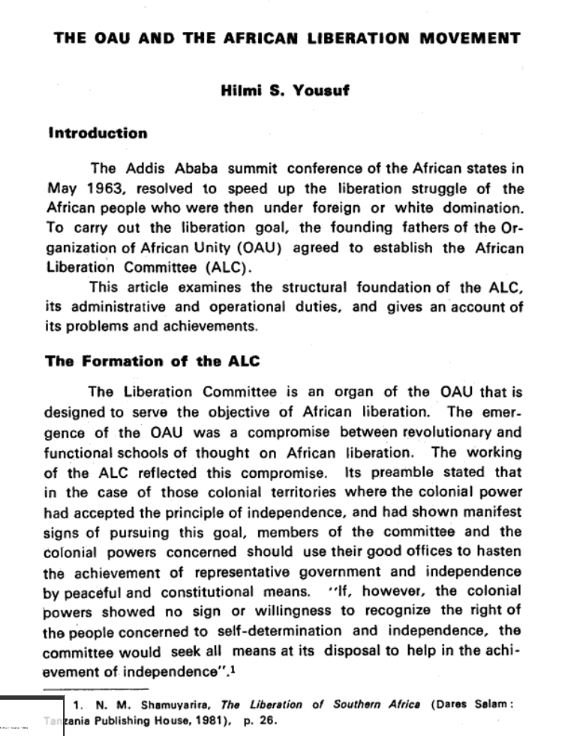
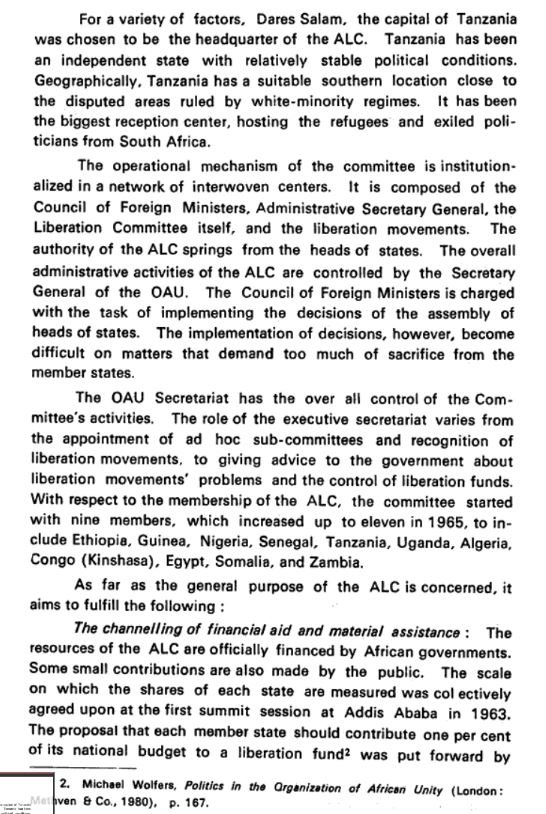
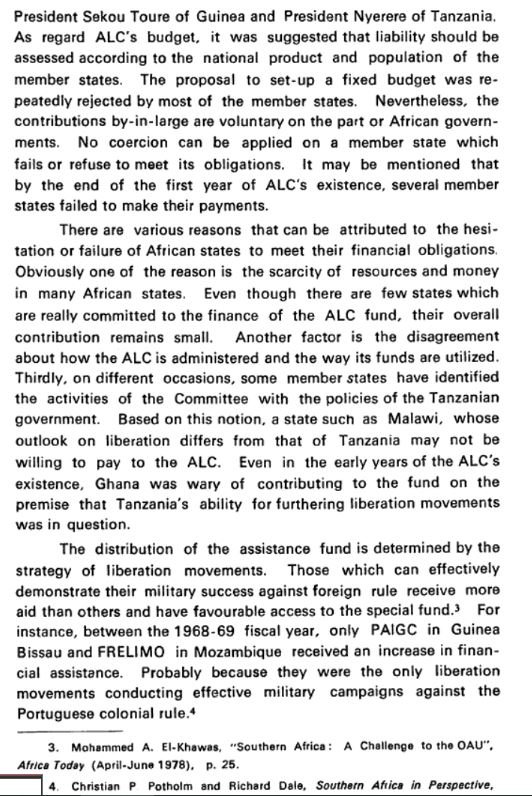
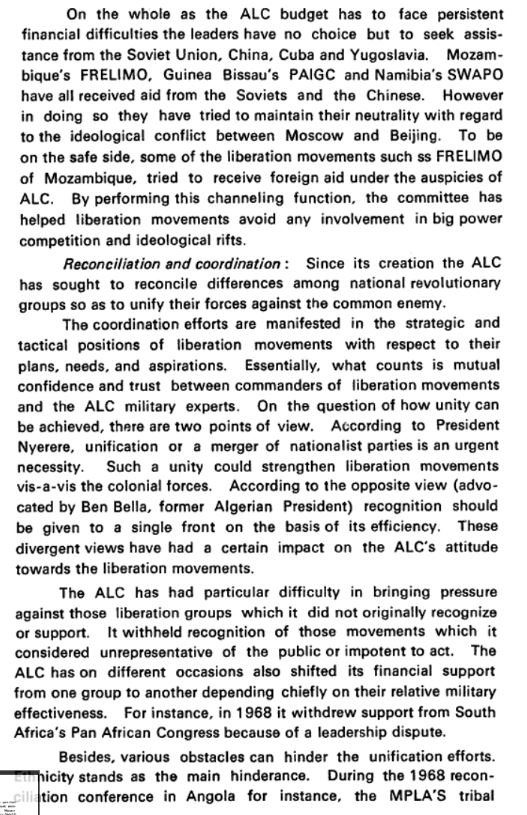
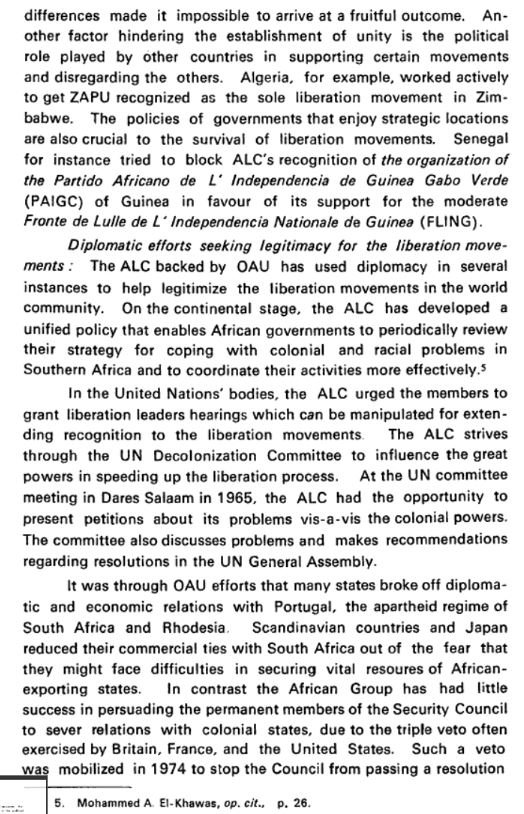
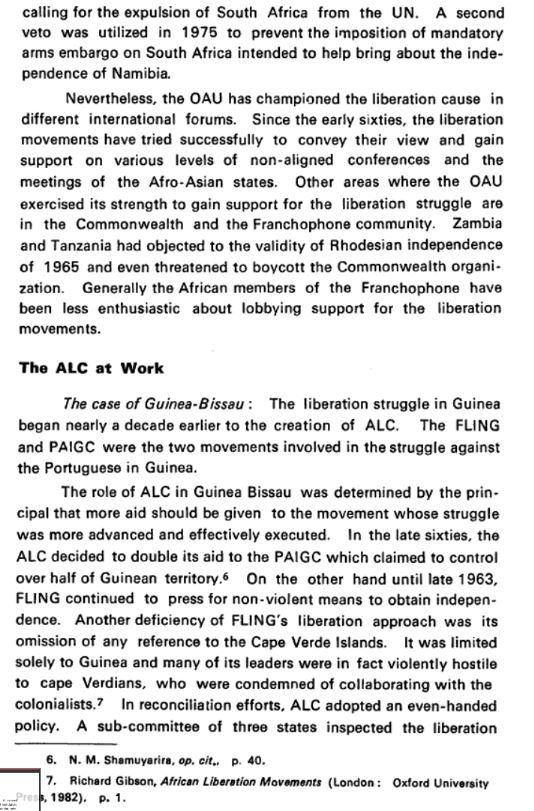
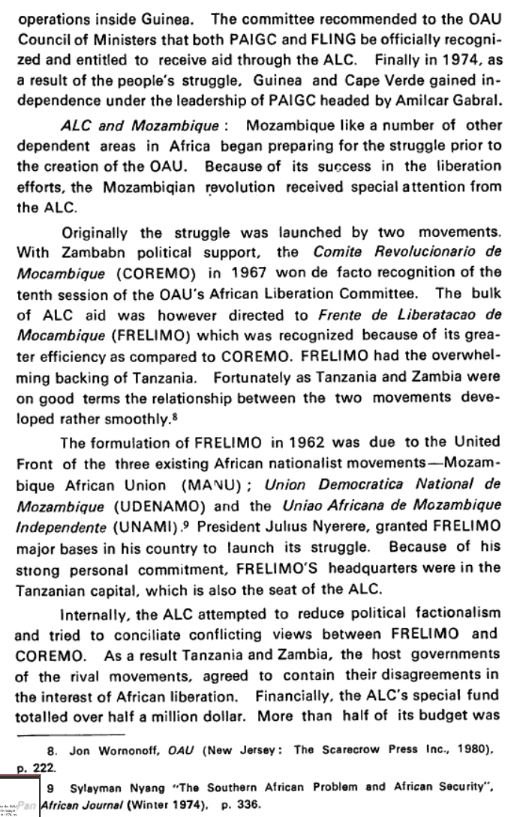
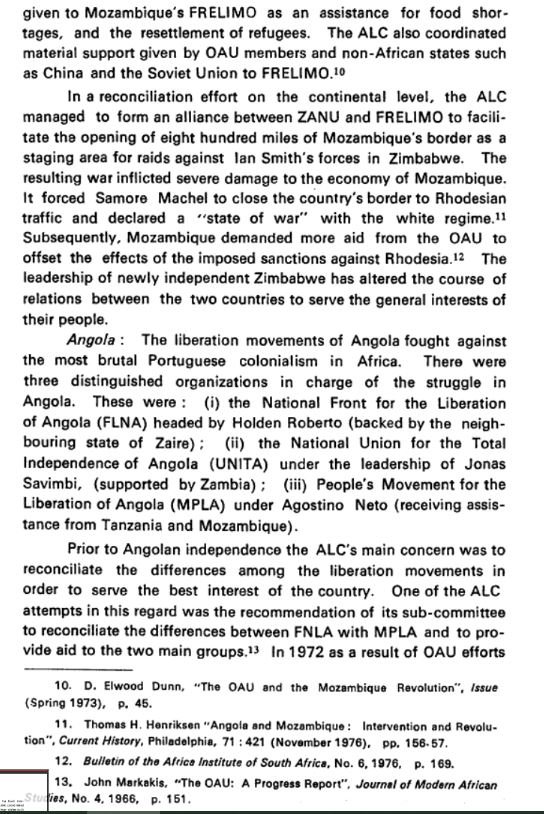
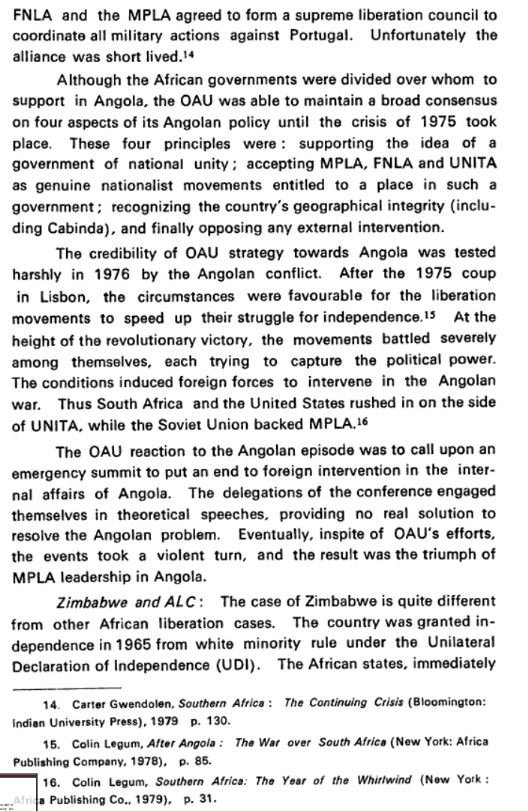
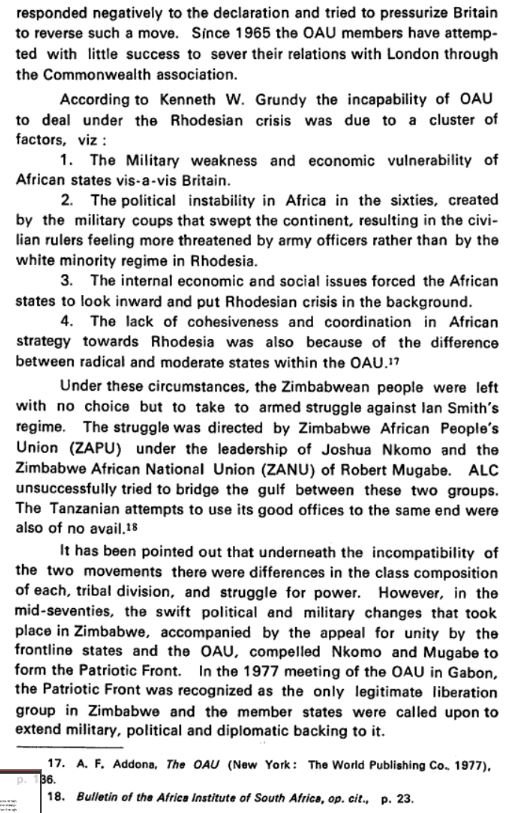
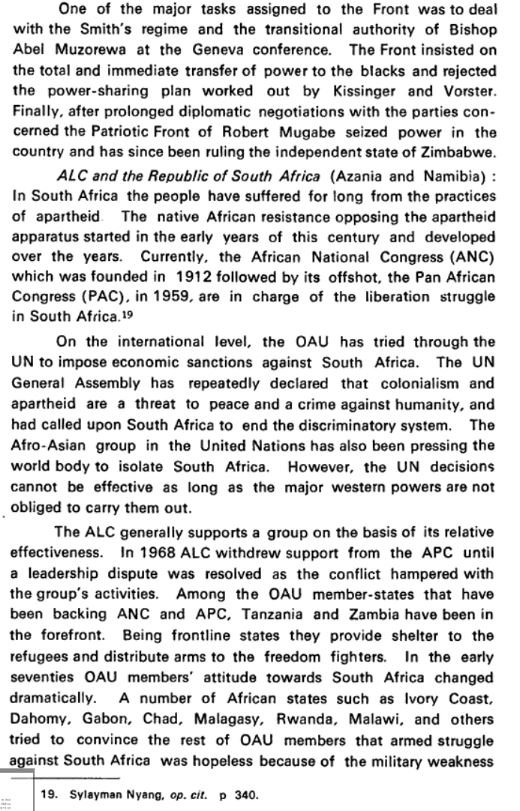
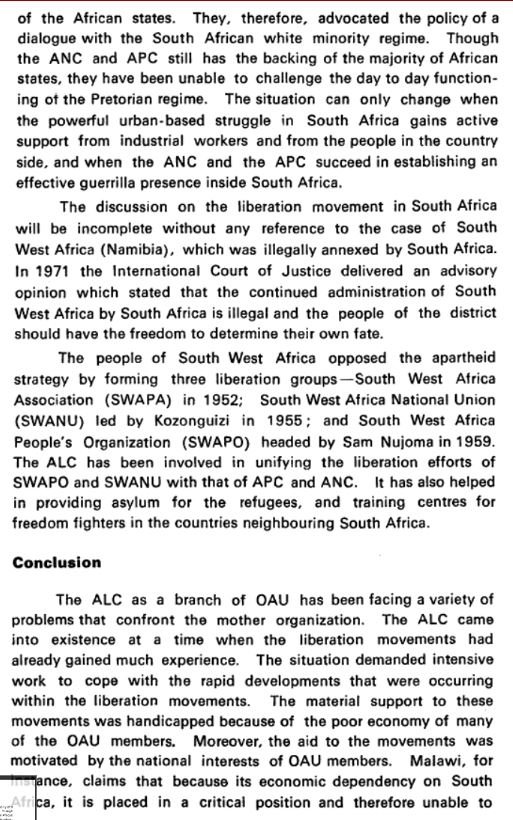
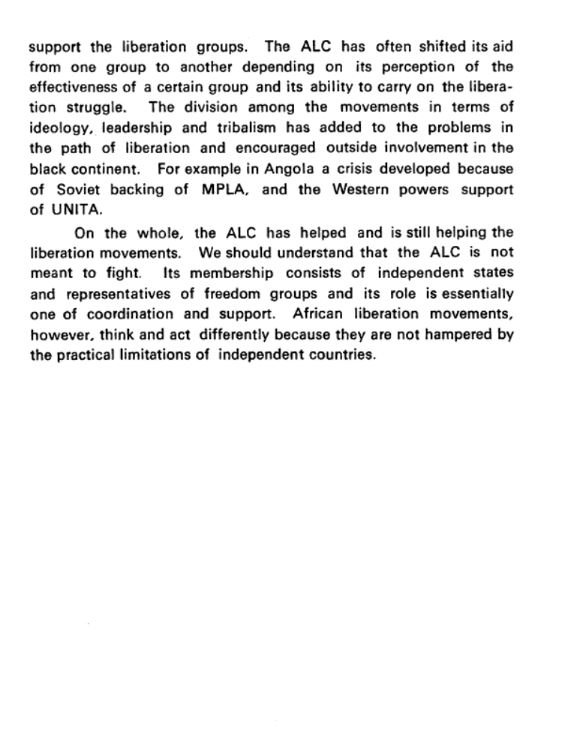
In 𝑹𝒆𝒇𝒍𝒆𝒄𝒕𝒊𝒐𝒏𝒔 𝒐𝒇 𝒂 𝑹𝒆𝒔𝒐𝒍𝒖𝒕𝒆 𝑹𝒂𝒅𝒊𝒄𝒂𝒍, Donald Freeman writes,
"In December, 1964 Doug Andrews, Paul Brooks, Tom Higginbotham, Max Stanford, and other members met in Cleveland to refine RAM’s 1965 priorities and strategy. . . . We discussed how to galvanize the energy of young urban African Americans, thereby enhancing the applicability of Rob Williams’ explosive advocacy in the United States and 𝒐𝒖𝒓 𝒄𝒐𝒐𝒓𝒅𝒊𝒏𝒂𝒕𝒊𝒐𝒏 𝒘𝒊𝒕𝒉 𝑬𝒍 𝑯𝒂𝒋𝒋 𝑴𝒂𝒍𝒊𝒌 𝑺𝒉𝒂𝒃𝒂𝒛𝒛’𝒔 𝑶𝒓𝒈𝒂𝒏𝒊𝒛𝒂𝒕𝒊𝒐𝒏 𝒐𝒇 𝑨𝒇𝒓𝒐-𝑨𝒎𝒆𝒓𝒊𝒄𝒂𝒏 𝑼𝒏𝒊𝒕𝒚 (𝑶𝑨𝑨𝑼).
I was pleased with our youth and young adult penetration among college students stemming from the spring 1964 Nashville conference and gangs, which was a byproduct of my work with others in Chicago during the summer. I hoped that this progress was the prelude to a significant conversation of young Black men and women to RAM’s ranks in 1965.
As January 1965 began, Malik Shabazz was busy seeking the backing of Ghana, Algeria and more African governments to bring about the condemnation of the United States’ oppression of Black America in the UN. Such internationalization of the African American liberation struggle as a human rights issue was a principal objective of the OAAU.
By that time Max Stanford had become one of Malik Shabbazz’s constant Harlem companions. Their communication was continuous. Hence RAM’s agenda was an integral part of his activities.
Then a series of ominous events beset El Hajj Malik Shabazz. In late November 1964 he had been invited to speak in France and Great Britain. February 8, 1965 he spoke again in London, but was not allowed to return to France the next day. On February 14th, his East Elmhurst, New York home was firebombed.
A further foreboding misfortune was the February 16th, 1965 New York City arrest of Walter Bowe, Robert Collier, Khaleel Sayyed, and Michelle Duclos, a French-Canadian woman, for allegedly plotting to bomb the Statue of Liberty.
What these menacing omens portended was actualized by the assassination of El Hajj Malik Shabazz at the Audubon Ballroom, on Sunday afternoon, February 21, 1965. The bourgeois (capitalist) mass media claimed that the Nation of Islam perpetuated that heinous crime. However, RAM asserted that its perpetrators were the CIA and FBI. . . . The arrests of Walter Bowe, Robert Collier, Khaled Sayyed, and Michelle Duclos in the so-called bombing of the Statue of Liberty plot and the murder of Malik Shabbaz marked the prelude to the CounterIntelligence Program (COINTELPRO) of the FBI, which eventually engineered the liquidation of Fred Hampton, the head of the Black Panther Party (BPP) of Chicago."
In August of 1965, Robert F Williams, living in exile in Cuba, published an analysis on the 𝑷𝒐𝒕𝒆𝒏𝒕𝒊𝒂𝒍 𝒐𝒇 𝑨 𝑴𝒊𝒏𝒐𝒓𝒊𝒕𝒚 𝑹𝒆𝒗𝒐𝒍𝒖𝒕𝒊𝒐𝒏 𝒊𝒏 𝒕𝒉𝒆 𝑼𝑺𝑨.
On June 17, 1966, Stokely Carmichael, then Chairman of the Student Non-Violent Coordinating Committee (SNCC) which was organized in April 1960 by Balanta activist Ella Baker, formally announced Black Power as a political slogan during a speech in Greenwood, Mississippi. Afterwards, the Malcolm X Society was organized in 1967.
After the 1967 riots, the FBI and their COINTELPRO program targeted RAM for political destruction. However, RAM was just one of many civil rights or black nationalist groups targeted because of their politics.
The New Afrikan liberation struggle, however, continued. On March 31, 1968, at the National Black Government Conference sponsored by the Malcolm X Society, the New Afrikan Declaration of Independence was declared and the Provisional Government of the Republic of New Afrika was established.
On May 31, 1968 about 30 leaders of the RNA met at 40 North Ashland Avenue in Chicago to address some of the biggest issues facing the new government. Among them was,
“the legislative act that established the Black Legion, the RNA’s military. Similar to the income tax, the creation of this body was supposed to resolve another perceived problem - this time not just for the RNA but for the larger African American community as well. Specifically, the RNA tried to address the heightened security threats to the black community by the overt behavior of racist police as well as other members of the white community. This addressed a longer historical problem as well.
The creation of the Black Legion was also tied to the greatest repressive fear of the organization: being directly hit by an overt, aggressive assault like that waged [upon] nonviolent civil rights activists (from whites in general and the police in particular). The RNA vowed that it would never be hit in such a direct manner without preparation. Two reasons existed for this. On the one hand, the RNA vowed never to put themselves in a position where they were vulnerable to this type of attack (i.e., being out in the open, unarmed and unprepared). Instead, the RNA would try to build themselves in the minds of black folk and then step forward to claim the nation en masse. On the other hand, the RNA would prepare to defend themselves by creating an armed wing, trained in shooting, hand-to-hand combat, and diverse survival skills. This was the essence of the organization’s reappraisal - armed self-defense from overt general assault, both immediately after the attack and a ‘second strike,’ which would be delayed after the initial attack as retribution. The plans for the former were pretty straightforward, whereas the plans for the latter were never quite clear, seemingly on purpose. For example, there was always reference to people being ‘underground’ but nothing concrete - across source material.
As conceived, the Black Legion would be composed of selected citizens between the ages of sixteen and fifty, the men and women being in separate units for reasons that were not provided in detail. All were to engage in two hours of training per week, and once a month there would be practice on a field training site. In addition to this, all male citizens between the ages of sixteen and fifty and all female citizens between the ages of sixteen and thirty (without young children) were mandated to join the Universal Military Training Force. Similar to the state of Israel, in an effort to have as many soldiers as citizens, this force involved at least two hours of military training a month, when individuals would learn how to shoot, dress wounds, and otherwise take care of themselves in a conflict situation. Finally, to prepare RNA members as soon as possible and engage the whole family, there was to be a Junior Black Legion composed of all children between the ages of nine and fifteen. In these units, youth would undergo a less rigorous but largely similar program.“
9. AUGUST 25, 1967 - COINTELPRO REVISES THE US WAR STRATEGY: THE NEW AFRIKAN/BLACK NATIONALISTS BECOME THE NUMBER ONE UNITED STATES NATIONAL SECURITY THREAT
On August 25, 1967, the United States government launched a new CounterIntelligence Program against “Black Nationalists” calling the “Hate Groups” instead of freedom fighters seeking justice. According to the The Federal Bureau of Investigations (FBI) memo revising the United States’ war strategy,
“The purpose of this new counterintelligence endeavor is to expose, disrupt, misdirect, discredit or otherwise neutralize the activities of black nationalist organizations and groupings, their leadership, spokesmen, membership, and supporters, and to counter their propensity for violence and civil disorder. The activities of all such groups of intelligence interest to this Bureau must be followed on a continuous basis so we will be in a position to promptly take advantage of all opportunities for counterintelligence and to inspire action in instances where circumstances warrant. The pernicious background of such groups, their duplicity, and devious maneuvers must be exposed to public scrutiny where such publicity will have a neutralizing effect.”
The policy was then expanded on March 3, 1968 in another FBI secret memo that listed the goals of the war against the New Afrikan people:
1. Prevent the COALITION of militant black nationalist groups. In unity there is strength; a truism that is no less valid for all its triteness. An effective coalition of black nationalist groups might be the first step toward a real “Mau Mau” [Black revolutionary army] in America, the beginning of a true black revolution.
2. Prevent the RISE OF A “MESSIAH” who could unify, and electrify, the militant black nationalist movement. Malcolm X might have been such a “messiah” he is the martyr of the movement today. Martin Luther King, Stokely Carmichael and Elijah Muhammed all aspire to this position. Elijah Muhammed is less of a threat because of his age. King could be a very real contender for this position should he abandon his supposed “obedience” to “white, liberal doctrines” (nonviolence) and embrace black nationalism. Carmichael has the necessary charisma to be a real threat in this way.
3. Prevent VIOLENCE on the part of black nationalist groups. This is of primary importance, and is, of course, a goal of our investigative activity; it should also be a goal of the Counterintelligence Program to pinpoint potential troublemakers and neutralize them before they exercise their potential for violence.
4. Prevent militant black nationalist groups and leaders from gaining RESPECTABILITY, by discrediting them to three separate segments of the community. The goal of discrediting black nationalists must be handled tactically in three ways. You must discredit those groups and individuals to, first, the responsible Negro community. Second, they must be discredited to the white community, both the responsible community and to “liberals: who have vestiges of sympathy for militant black nationalist [sic] simply because they are Negroes. Third, these groups must be discredited in the eyes of Negro radicals, the followers of the movement. This last area requires entirely different tactics from the first two. Publicity about violent tendencies and radical statements merely enhances black nationalists to the last group; it adds “respectability” in a different way.
5. A final goal should be to prevent the long-range GROWTH of militant black organizations, especially among youth. Specific tactics to prevent these groups from converting young people must be developed.
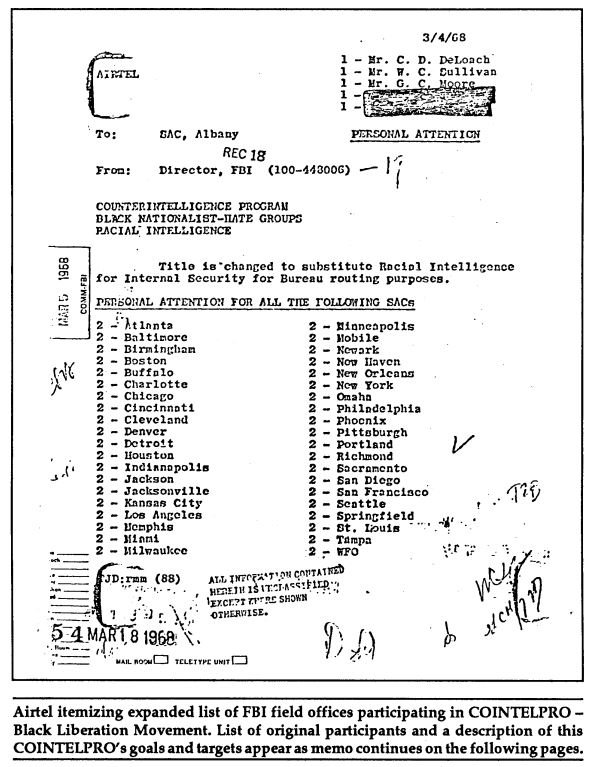
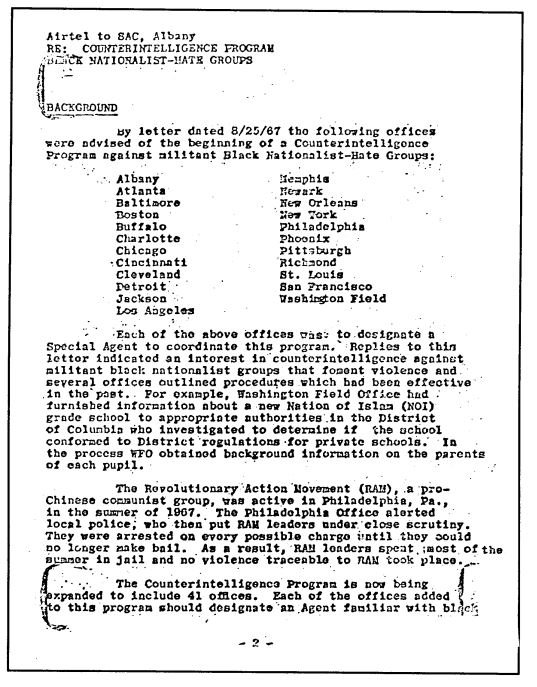
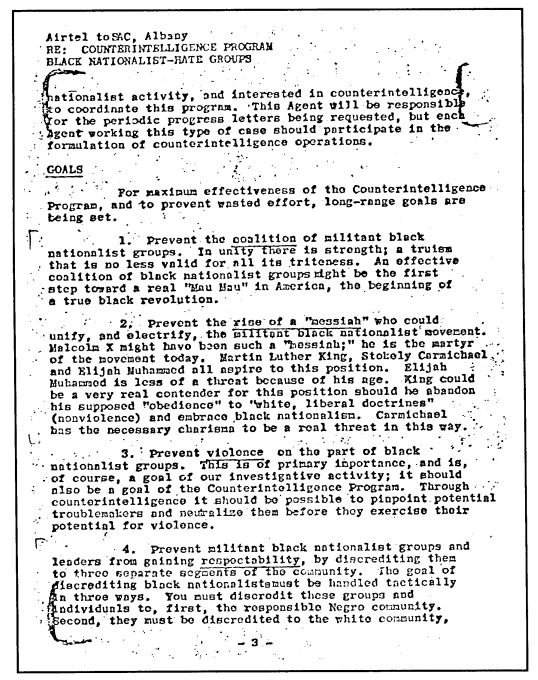
Tactics used to suppress RAM were also used to suppress and target Student Nonviolent Coordinating Committee (SNCC), Southern Christian Leadership Conference (SCLC), Congress of Racial Equality (CORE), the Black Panther Party, the Nation of Islam, the National Welfare Rights Organization, Dodge Revolutionary Union Movement (DRUM), Republic of New Afrika (RNA), Congress of Afrikan People, black student unions at universities all over the country, and black churches and community organizations. In this context of government repression, RAM transformed itself into the Black Liberation Party, and by 1969 had practically dissolved.
At the second RNA Conference, on March 29, 1969, police raided the Detroit New Bethel Baptist Church. The police attempted to assassinate Gaidi Obadele and fired on conference participants with nearly a thousand rounds of ammunition.
A memorandum issued on April 27, 1971 captioned “Counterintelligence Programs” listed seven sustained and overarching operations involving collaboration with local police to establish special units, with FBI “assistance” and “influencing” street gangs and criminal enterprises through infiltration and undercover activities. Street gangs and drug-gangs became the proxy forces employed to effect and control de-politicization of the youth in the communities with special police elements created to “combat” them (the public narrative was to “combat crime” but the special police function was to manage it.) Hence, the drug-task force, gang task force, street-crimes task force, gang intelligence units, etc. While the stated targets of under-cover infiltration were gangs and criminals, the actual practice of operations was directed at all organizations and group activity of New Afrikans, either through placement of an agent, or development of an asset (confidential informant). The language used for indoctrination narratives directed at police personnel and organizations characterized the “threat” as “Black nationalist hate groups,” however in practice, the policy of infiltration, disruption and suppression included any and all groups advocating for “Black empowerment,” “equal justice,” or any other socio-political interest of New Afrikans.
10. MARCH 17, 1978 - US NATIONAL SECURITY MEMORANDUM 46 UPDATES AND EXPANDS THE WAR AGAINST THE NEW AFRIKAN LIBERATION MOVEMENT
The war was then updated and expanded on March 17, 1978 with National Security Memorandum 46. The President directed that a comprehensive review be made of current developments in Black Africa from the point of view of their possible impacts on the black movement in the United States. The review considered “Appropriate steps to be taken inside and outside the country in order to inhibit any pressure by radical African leaders and organizations on the U.S. black community for the latter to exert influence on the policy of the Administration toward Africa.” The review also stated,
“An occurrence of the events of 1967-68 would do grievous harm to U.S. prestige, especially in view of the concern of the present Administration with human rights issues. Moreover, the Administration would have to take specific steps to stabilize the situation. Such steps might be misunderstood both inside and outside the United States. In order to prevent such a trend and protect U.S. national security interests, it would appear essential to elaborate and carry out effective countermeasures.
RECOMMENDATIONS
In weighing the range of U.S. interests in Black Africa, basic recommendations arranged without intent to imply priority are:
1. Specific steps should be taken with the help of appropriate government agencies to inhibit coordinated activity of the Black Movement in the United States.
2. Special clandestine operations should be launched by the CIA to generate mistrust and hostility in American and world opinion against joint activity of the two forces, and to cause division among Black African radical national groups and their leaders.
3. U.S. embassies to Black African countries specially interested in southern Africa must be highly circumspect in view of the activity of certain political circles and influential individuals opposing the objectives and methods of U.S. policy toward South Africa. It must be kept in mind that the failure of U.S. strategy in South Africa would adversely affect American standing throughout the world. In addition, this would mean a significant diminution of U.S. influence in Africa and the emergence of new difficulties in our internal situation due to worsening economic prospects.
4. The FBI should mount surveillance operations against Black African representatives and collect sensitive information on those, especially at the U.N., who oppose U.S. policy toward South Africa. The information should include facts on their links with the leaders of the Black movement in the United States, thus making possible at least partial neutralization of the adverse effects of their activity.”
9. THE UNITED STATES LAUNCHES NEW FORMS OF CLANDESTINE WARFARE AGAINST THE NEW AFRIKAN NATION: WAR ON POVERTY, WAR ON DRUGS, WAR ON TERRORISM
It has now become clear that the war against New Afrikans was continued by the United States government through a clandestine style of warfare utilizing espionage, sabotage, propaganda, and psychological operations in preparation for direct, overt military engagement that it had begun with the Office of Strategic Services (OSS) in World War II and continued under the title, Central Intelligence Agency (CIA).
Because of the post-World War II rise in New Afrikan political consciousness and empowerment that culminated with the Black Liberation Movement and the March 28-31, 1968 National Black Government Conference which issued the Declaration of New Afrikan Independence and established the Provisional Government of the Republic of New Afrika (PG-RNA), the New Afrikan Independence Movement was perceived by the United States (oppressor state) as a direct proxy threat controlled by the COMINTERN (international communism). A mass movement of the former-slave descendant population underwritten by an armed New Afrikan-nationalist insurgency whose above-ground face was Malcolm X, constituted a military threat that could not be tolerated, and that required a military solution. US (oppressor state) law and purported legal ethics underlying its “state persona” prohibited using military forces for domestic policing (Posse Comitatus Act, etc.). Of more importance, a significant aspect of suppressing and destroying the “Black Nationalist’s” movement was the need for creating and maintaining the public perception and belief that the conflicts of interests were merely domestic issues with political solutions.
This was necessary both for dissuading international recognition of New Afrikan national identity and struggle, as well as undermining and marginalizing slave-descendant popular support for New Afrikan Independence mobilization.
Overt general military application was contrary to these goals. Solving this dilemma began with militarizing domestic policing. The development of SWAT teams and other police special operations concepts and capabilities was established. Additionally, the United States (as oppressor state) media propaganda narrative mis-identifies, defines and describes “African-Americans” in the context of “domestic policy” matters in order to prevent an New Afrikan national identity from taking root while actually treating them as a national security threat under foreign policy.
Thus, in fact (law) and practice, matters affecting the political existence of New Afrikans are calculated and acted upon as foreign policy and the United States now recognizes and institutionalizes a condition of permanent “counterrevolution” as a national security requirement. It’s a matter of national security because a politically independent and assertive New Afrikan social order inherently undermines the continued dominance and power of the established Anglo political construct, both domestically and internationally. Under the doctrinal theme of ‘continuity of government, the United States, as the oppressor-state, undertook the establishment of infrastructure designed to suppress rebellion against the “authority of the United States”. The focus of this national security doctrine is on domestic insurgency and the need to preemptively neutralize it. This has been a matter of policy beginning with, and since, the 1950 Internal Security Act (McCarran Act).
War was declared on New Afrika, and has escalated successively in New Afrikan national territory and New Afrikan communities outside the national territory through the militarization of domestic police and infusion of special operations tactics, techniques and procedures in black communities under the Campaign Code name: War on Poverty;
through the institutionalization of COINTELPRO concept and infusion of federal control and resources into State and local police agencies and prosecutorial offices at the tactical engagement level (Multi-jurisdiction Task Force) Campaign Code name: War on Drugs;
through formalization of COINTELPRO policy goals and legalization of procedures into official National Security Doctrine, and establishment of a permanent, integrated agency management system - Department of Homeland Security/ U.S. Northern Command - Campaign Code Name: War on Terror (Countering Violent Extremism).
The result of these wars have been the incarceration of millions of black people, a legally-permissible form of slavery under the U.S. 13th Amendment, including the specific imprisonment of New Afrikan political dissidents and leaders and the siphoning off of New Afrikan wealth into the prison industrial complex. Thus, there were more black slaves in US prison than there were slaves in 1850 before the start of the civil war.
It is important to understand that the United States oppressor-state regime decision-makers and controllers have never had any illusions of expectation that the idea of New Afrikan national independence will just evaporate in the near term. Therefore, it has been planned from the beginning to prosecute this war to completion which ensures eradication of even the mere notion of a national identity among the African-slave descendant population.
To say that “war” is being waged against New Afrikan people is not rhetoric, nor is it imaginary. Again, the COINTELPRO long term goals are:
Prevent unity
Prevent rise of a leader
Identify and neutralize [warriors]
Alienate the concept of nationalism from the people
Prevent nationalism from embedding in youth and future generations
These goals are no different than those of King Ramses the Second in Egypt who was advised to eradicate all potential threats to his throne and came up with the idea of killing all male newborns born at that time.
The African Charter on Human and People's Rights, Article 20 Section 3 states, "𝑨𝒍𝒍 𝒑𝒆𝒐𝒑𝒍𝒆𝒔 𝒔𝒉𝒂𝒍𝒍 𝒉𝒂𝒗𝒆 𝒕𝒉𝒆 𝒓𝒊𝒈𝒉𝒕 𝒕𝒐 𝒕𝒉𝒆 𝒂𝒔𝒔𝒊𝒔𝒕𝒂𝒏𝒄𝒆 𝒐𝒇 𝒕𝒉𝒆 𝑺𝒕𝒂𝒕𝒆𝒔 𝑷𝒂𝒓𝒕𝒊𝒆𝒔 𝒕𝒐 𝒕𝒉𝒆 𝒑𝒓𝒆𝒔𝒆𝒏𝒕 𝑪𝒉𝒂𝒓𝒕𝒆𝒓 𝒊𝒏 𝒕𝒉𝒆𝒊𝒓 𝒍𝒊𝒃𝒆𝒓𝒂𝒕𝒊𝒐𝒏 𝒔𝒕𝒓𝒖𝒈𝒈𝒍𝒆 𝒂𝒈𝒂𝒊𝒏𝒔𝒕 𝒇𝒐𝒓𝒆𝒊𝒈𝒏 𝒅𝒐𝒎𝒊𝒏𝒂𝒕𝒊𝒐𝒏, 𝒃𝒆 𝒊𝒕 𝒑𝒐𝒍𝒊𝒕𝒊𝒄𝒂𝒍, 𝒆𝒄𝒐𝒏𝒐𝒎𝒊𝒄 𝒐𝒓 𝒄𝒖𝒍𝒕𝒖𝒓𝒂𝒍."
Free the Land! Reparations by any means necessary,
Siphiwe Baleka
Minister of Foreign Affairs
DIFFERENT ELEMENTS AND PARTS OF PG-RNA
The People’s Center Council (PCC)– Congress, National Legislature or Parliament is made up of District Representatives from PGRNA electoral districts across the U.S.A.
The People’s Revolutionary Leadership Council (PRLC) — A Cabinet headed by the National President, three National Vice Presidents, Ministries, Court System, and Other Govt. entities, including the Land Fund Committee, etc.
PG-RNA CABINET IN 1968:
1st President: Robert F. Williams (1925-1996) : He was in China 1966 to May 1968; Tanzania, May 1968 to Sept. 1969. 1st Vice President: Gaidi Obadele (Atty. Milton R. Henry) 2nd Vice President: Betty Shabazz (1934-1997) Minister of Information: Imari A. Obadele (Richard Bullock Henry) Minister of Health and Welfare: Queen Mother Moore (1899-1997) Minister of Education: Herman Ferguson Minister of State and Foreign Affairs: William Grant Minister of Defense: H. Rap Brown (now, Jalil Al Amin): He was also Minister of Justice for BPP in May 4, 1968 issue of The Black Panther. Co-Ministers of Culture: Imamu Amiri Baraka (LeRoi Jones), Maulana Karenga and Nana Oserjiman Adefumi Minister of Justice: Joan Franklin Minister of Finance: Raymond Willis Treasurer: Obaboa Owolo (Ed Bradley) Minister without Portfolio or Special Ambassador: Muhammad Ahmed (Maxwell Stanford)
PG-RNA CABINET IN 1969:
President: Robert F. Williams (1925-1997): He returned to U.S. (Detroit), Sept. 1969. (The Black Panther, Dec. 6, 1969; Jan. 3, 1970). 1st Vice President: Gaidi Obadele (Atty. Milton R. Henry) 2nd Vice President: Betty Shabazz (d. 1997) Minister of Education: Maulana Karenga: denounced and removed by PCC in Detroit, Apr. 5th. Herman B. Ferguson was afterwards appointed Minister of Education, East Coast Vice President, and acting director of Freedom Corps. Minister of State and Foreign Affairs: Wilbur Grattan Sr. Minister of Defense: Mwuesi Chui, commander of Black Legion
The “New Bethel Incident” took place in Detroit, Michigan, in March 31, 1969 during the First New Afrikan Nation Day Celebration at the New Bethel Baptist Church, on the West Side. One policeman killed and another wounded. Four Blacks wounded. Between 135 and 240 persons were arrested. Police later freed 125 persons [http://en.wikipedia.org/wiki/George_W._Crockett,_Jr. Criminal Court Judge George Crockett], frees 8 other Blacks. Chaka Fuller, Rafael Viera, and Alfred 2X Hibbets were charged with killing. All 3 were subsequent tried and acquitted. Chaka Fuller was mysterious assassinated a few months afterwards.
Southern Regional Minister of Defense: Jomo Kenyatta (Henry Hatches) Consul for Jackson, MS: Carolyn Williams April 2, 1969 – The New York BPP “21” arrested on conspiracy charges.
In 1969, a Newsweek magazine poll of Afrikans in the Northern U.S. showed that 27 percent of Afrikans under age thirty (and 18 percent of those over the age of thirty), wanted an independent Afrikan state.
PG-RNA CABINET IN 1970:
President: Imari A. Obadele Minister of Defense: Alajo Adegbalola (Leroy Boston) Dara Abubakaru (Virginia Collins)
PG-RNA CABINET IN 1971:
President: Imari Obadele , Minister of Defense: Alajo Adegbalola Minister of Information: Aisha Salim of Philadelphia Consul from Detroit: Chokwe Lumumba
Workers of the PG-RNA also announced that they would not permit those who opposed the peaceful plebiscite to shoot at them with impunity. The RNA cadres in Mississippi and elsewhere, in 1970 and 1971 were armed for self-defense.
March 5th, BPP sponsors a Day of Solidarity dedicated to “Freedom of Political Prisoners.”
On March 28th-Land Celebration Day-the RNA Capitol consecrated, Hinds County, Mississippi. Between 150 and 200 persons attended the dedication.
They used, and use, political means rather than military means. The United States Justice Department, instead of helping to organize the plebiscite; on 18 August 1971 a force of 60 FBI agents and 40 local Jackson police staged an armed attack on the official Government Residence (the main residence-office of the PG) in Jackson, Mississippi, supposedly to serve fugitive warrants on three RNA members (one being a FBI informant/agent provocateur). The seven people in the house were not wounded by the 20-minute barrage of bullets–a skirmish, but one police lieutenant died and another policeman and an FBI agent were wounded. Five young men and two young women at this house were captured, along with PG-RNA President, Imari Obadele, the Minister of Information and two others in a nearby office, and sent to jail.
The Suppressed History of New Africans Fighting For Independence- Haki Kweli Shakur
In the face of this unprovoked attack, three PG-RNA workers: Antar Ra, Maceo Sundiata (fsn Michael Finney) and Fela Sekou Olatunji (fsn Charles Hill) from the Bay Area, left in response to the call for Mississippi to provide support and defense for our assaulted movement. Clearly the U.S. had declared war on us! While driving east, the three were intercepted by a policeman whose aggressiveness caused his death. They then commandeered an airline and arrived in Cuba. They were granted asylum.
(On August 19th, FBI and police tried to assassinate President Imari Obadele.)
They are convicted two years later. Most served long years in jail. Their sovereign immunity demand was flatly rejected by the United States’ courts and executive branch, and no one was accorded treatment as a prisoner-of-war.
The Republic of New Afrika-Eleven (RNA-11): Citizens of the RNA: Imari Obadele; Hekima Ana and his wife, Tamu Ana, and Chumaimari Askadi (fsn Charles Stallings), all of Milwaukee; Karim Njabafudi (fsn Larry Jackson) of New Orleans; Tarik/Tawwab Nkrumah (fsn George Matthews) of Birmingham; Addis Ababa (fsn Dennis Shillingford) of Detroit; Offogga Qudduss (fsn Wayne Maurice James) and Njeri Qudduss, both of Camden, New Jersey; Spade de Mau Mau (fsn S. L. Alexander) of New Orleans; and Minister of Information Aisha Salim (fsn Brenda Blount) of Philadelphia.
PG-RNA CABINET IN 1972:
President: Gaidi Obadele Vice Presidents: Alajo Adegbalola, Chokwe Lumumba, Herman B. Ferguson New Afrikan Security Forces: Black Legion commander: Gen. Mwuesi Chui
In 1972, Ahmed Obafemi of New York had been sentenced on a gun charge clearly engineered by the F.B.I.’s Cointelpro. The F.B.I. succeeded in framing this key leader and officer of the RNA-PG. He was doing political work at the Democratic National Convention in Miami, Florida. Sentenced with him was Tarik Sonnebeyatta, of Camden, New Jersey. Brother Ahmed was jailed.
PG-RNA CABINET IN 1973:
Jan. 7, 1973 – Mark Essex, 23; is killed atop New Orleans hotel after killing 6 and wounding 15. Jan. 19th – One policeman killed and 2 wounded as Black freedom fighters seize a Brooklyn sporting goods store. May 2nd – Assata Shakur (fsn JoAnne Chesimard) wounded and Sundiata Acoli (fsn Clark Squire) arrested. Nov. 14th – Twyman Fred Myers, 23, BLA member, ambushed by FBI and New York police; was 6th BLA member killed in this fashion.
1975
PG-RNA CABINET IN 1980:
President: Imari Obadele A study conducted among Afrikan college students by Professor Luke Tripp which showed that 34 percent of the students favored an independent Afrikan state in North Amerika.
By the middle of 1980, because of public support and intense legal work, almost all of the RNA-11 (except for one) were set free and out of jail.
In the fall, some members of BLA, and some accused of being BLA personnel, had come under intense concentration by FBI and, principally, New York, New Jersey, and California police.
PG-RNA CABINET IN 1981:
President: Imari Obadele PCC Chairperson: Fulani Sunni-Ali
July 1983 – People’s Center Council (PCC) Meeting in Atlanta, Georgia, RNA National Territory.
Oct./Nov. 1984 – Third National New Afrikan Elections
Nov. 1985 – People’s Center Council (PCC) Meeting in Chicago, Illinois.
PG-RNA CABINET IN 1986:
President: Imari Obadele Minister of Justice: Nkechi Taifa Minister of Defense: Gen. Chui
July 1986 – People’s Center Council (PCC) Meeting in New Orleans, Louisiana, RNA National Territory.
July 1986 – People’s Center Council (PCC) Meeting in Detroit, Michigan.
Sept. 1986 – People’s Center Council (PCC) Meeting in Brooklyn, New York.
PG-RNA CABINET IN 1987:
President: Imari Obadele Minister of Justice: Nkechi Taifa
July 1987 – People’s Center Council (PCC) Meeting in Washington, DC (Banneker City).
Oct./Nov. 1987 – Fourth National New Afrikan Elections
Oct./Nov. 1990 – Fifth National New Afrikan Elections: Kwame Afoh elected president.
PG-RNA CABINET IN 1991:
President: Kwame Afoh PCC Chairperson: Imari Obadele
PG-RNA CABINET IN 1992:
President: Kwame Afoh PCC Chairperson: Imari Obadele
PG-RNA CABINET IN 1993:
President: Kwame Afoh PCC Chairperson: Imari Obadele
Nov. 1993 – National New Afrikan Elections: President Kwame Afoh re-elected.
In April 1994, several mainstream newspapers (New York Times, Washington Post, Chicago Sun-Times, and the Wall Street Journal) ran articles dealing with University of Chicago Professor Michael Dawson and Professor Ronald Brown of Wayne State University. The report concerned the findings of a random national survey of 1,206 Afrikans in the U.S., which in Dawson’s words showed ” a more radical Black America than existed even five years ago.” (Wall Street Journal). It found that fifty percent of Afrikans in the U.S. believe that our people are “a nation within a nation.”
Oct. 1996 – National New Afrikan Elections: President Kwame Afoh re-elected.
PG-RNA CABINET IN 1997:
President: Kwame Afoh PCC Chairperson: Marilyn Preston Killingham
PG-RNA CABINET IN 1998:
President: Kwame Afoh PCC Chairperson: Marilyn Preston Killingham
Oct./Nov. 1999 – National New Afrikan Elections
https://newafrikan77.wordpress.com/2014/08/18/republic-of-new-afrikan/
